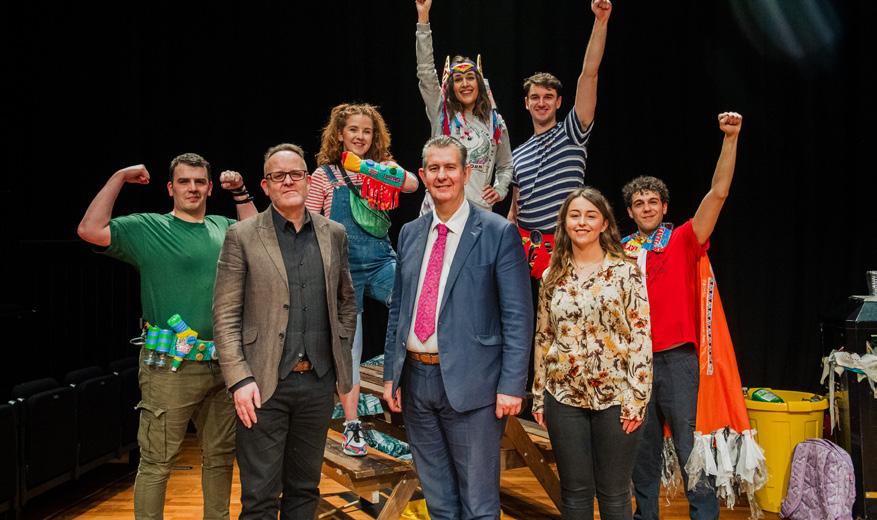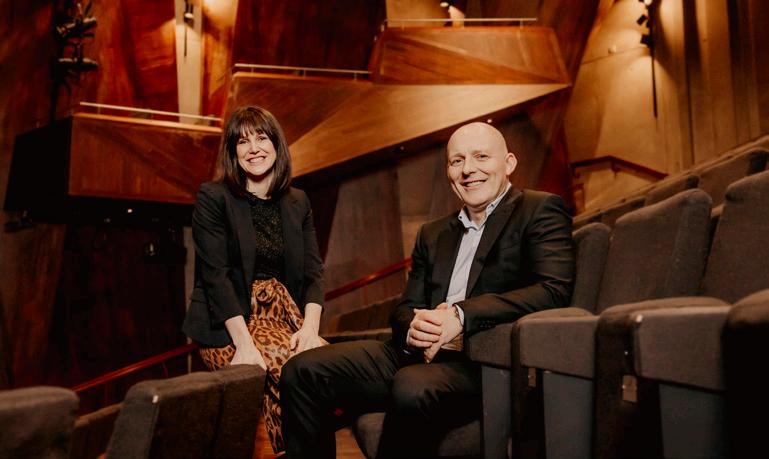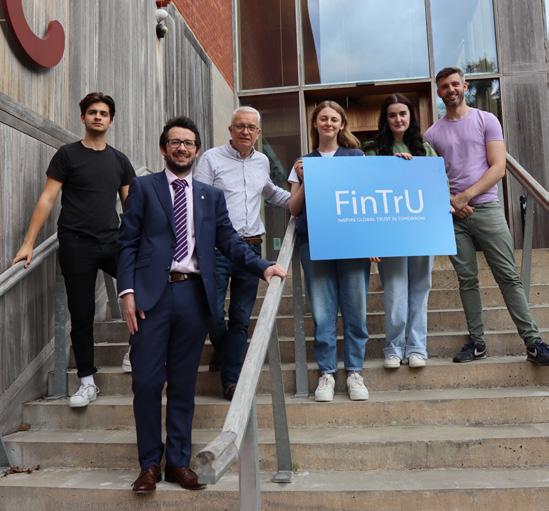

31 MAY6 JUL 2025









31 MAY6 JUL 2025






Behindthe glitteringwordplay liesaprofound meditation onidentity.
Hello, and welcome to the Lyric Theatre.
Thank you for joining us for our production of The Importance of Being Earnest by Oscar Wilde. It is a joy to welcome you into our auditorium for this dazzling, razor-sharp comedy, one that continues to sparkle with wit and insight more than a century after it premiered.
This production is part of a proud tradition here at the Lyric, where we celebrate not only the towering figures of Irish literature but also the vibrant, contemporary voices shaping our culture today. The Lyric is committed to nurturing emerging talent and uplifting local voices. These are voices that speak to the complexities, humour and spirit of life on this island. Every season, we
are privileged to support playwrights, artists and storytellers who, like Wilde in his day, challenge conventions and illuminate the world in fresh, fearless ways.
Oscar Wilde, born in Dublin and educated in Enniskillen and Trinity College, casts a long and luminous shadow across the Irish theatrical landscape. His work is part of the Lyric’s artistic DNA. Over the decades, we have returned to Wilde not simply out of admiration, but because his plays continue to challenge, delight and reveal.
As we approach the Lyric’s 75th anniversary, we are reflecting on what it means to tell stories here. Stories of contradiction, joy, duality and resilience. Wilde knew all about duality. Behind the glittering wordplay of The Importance of Being Earnest lies a profound meditation on identity, performance and the often-painful journey to
be one’s true self. That tension between outward appearances and inner truths feels as relevant today as it did in Wilde’s own time.
As we celebrate this milestone year, we honour the extraordinary artists who have walked our stage and the audiences, like you, who have made it all possible. Your presence continues to breathe life into this theatre, and we are so grateful you are here.
Enjoy the show and thank you for being part of this moment in the Lyric’s history and supporting its future.
Morag Keating Lyric Theatre Senior Producer
IamIrish. NotEnglishwhichis quiteanotherthing.
- Oscar wilde
In the rich history of extraordinary Irish playwrights perhaps no one haunts the theatrical imagination quite as exceptionally as Oscar Wilde. Not only because his witticisms are commonplace or that his plays sing out a hundred and thirty years after they were written, or that his life was Performance Art personified (and still makes good copy). But at the core of all his flippant and witty remarks, there is a truth that rings vivid and stark about the dual nature of human existence, the tension between outward performance and inward desire.
Because of the harsh Victorian laws governing sexuality, Oscar Wilde, like a lot of people of the period, was forced to live a double life in order to discover who he wanted to be. Having read several biographies of him, I am convinced he not only fell in love with the danger and thrill of this double life but also the challenge it presented to the morals of the world he lived in. A world that sought to tame him as a court jester. More than one of his contemporaries talk not only about his bright eyes, his zest for fun and the infectious delight he took in his success but also how the mists of the underworld wreathed about him growing higher and higher.
From the gaslit world of late 19thcentury theatre, no other playwright casts so large a shadow or extended such an influence. In his wake comes Yeats, Joyce, and Beckett. The gleeful shattering of literary rules, personalities, and language that these
geniuses explored in their work can be found in this fantastic fiction of Jack Worthing pursuing Gwendolyn Fairfax, Algernon Moncrieff dancing verbally with Cecily Cardew and Lady Bracknell’s shock at discovering Jack was found in a ‘handbag’.
Oscar was born in Dublin and spent his early years at Merrion Square. He was then educated from the age of nine in Portora Royal School, Enniskillen, County Fermanagh. From there, he went to Trinity College in Dublin, where one of his Trinity contemporaries, a fellow Dubliner, would go on to have a huge influence on Ulster, Edward Carson.
Becauseoftheharsh Victorianlaws governingsexuality, OscarWilde,likealot ofpeopleoftheperiod, wasforcedtolivea doublelife...
It was with Carson that Oscar would have his final, tragic, verbal duel. It is tempting to see the duality of their lives and the effect their respective work had on this island, one leading us outwardly to the bureaucracy of partition and the other bequeathing us a rich inner reservoir of imagination, anarchy, and fun.
When conceiving this production, I knew I wanted to keep it in its late Victorian setting but by way of a colourful, kaleidoscopic, possibly trippy feel. The 1890s were the beginning of many innovations, including the telephone and the moving image; there was an explosion in art, music, creative thought, and a burgeoning understanding of the fluid
sexuality of human nature. I thought it would be fun to have filmmaker Neil O’Driscoll create some of his mad-cap animated films during the transitions. I am deeply indebted to our incredible cast, creative team, and crew for bringing this production to life.and most recently, Oscar Wilde wanted The Importance of Being Earnest to go off like a pistol shot. It was the start of something extraordinary, of which we still feel the vibrations in our art, our morals, our politics, and our hunger for new experiences. You can see the play as absurd but no more absurd than the world that was to come.
I hope you enjoy our production of Oscar Wilde’s final great play.
Jimmy
Fay
Director & Executive Producer
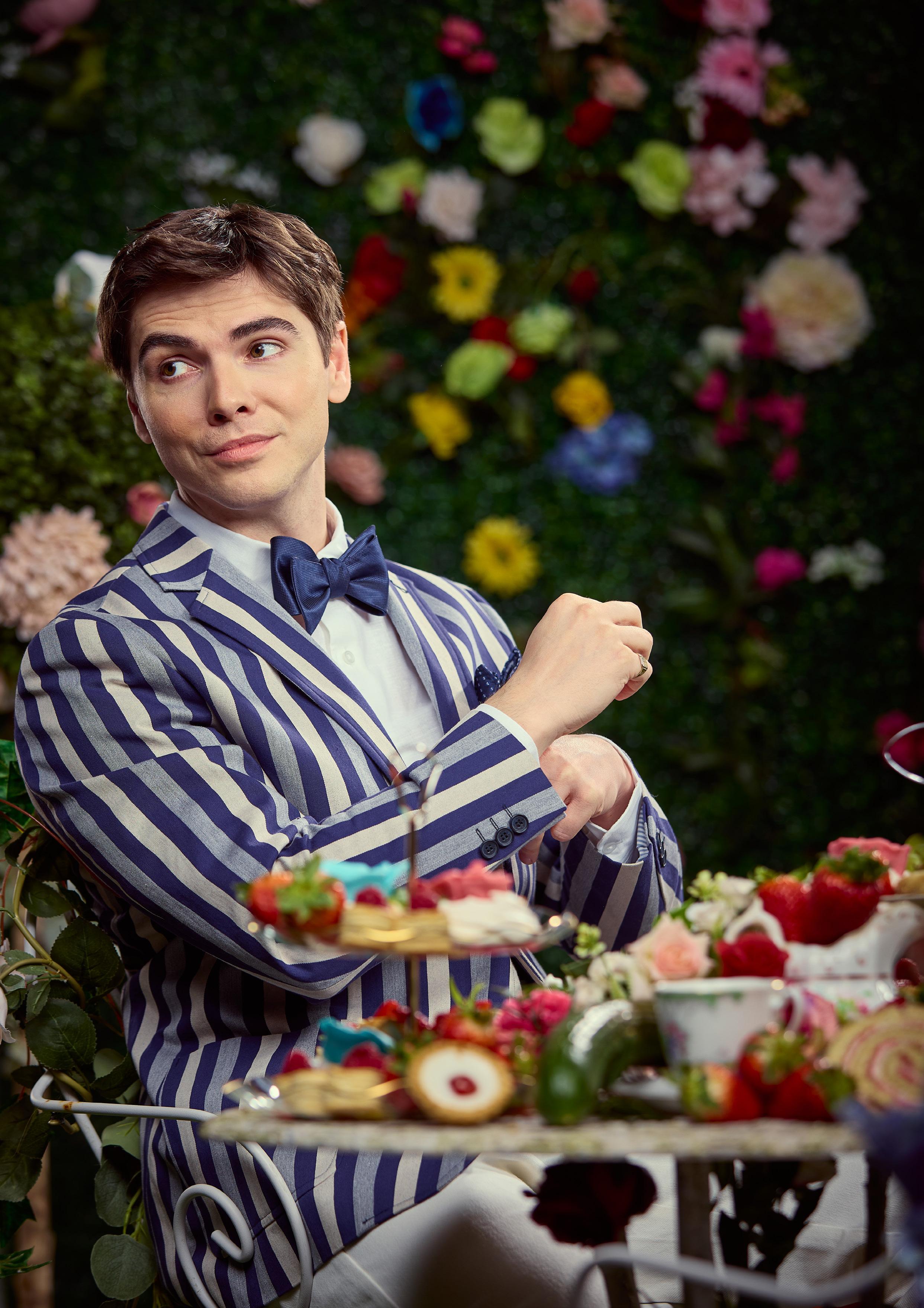
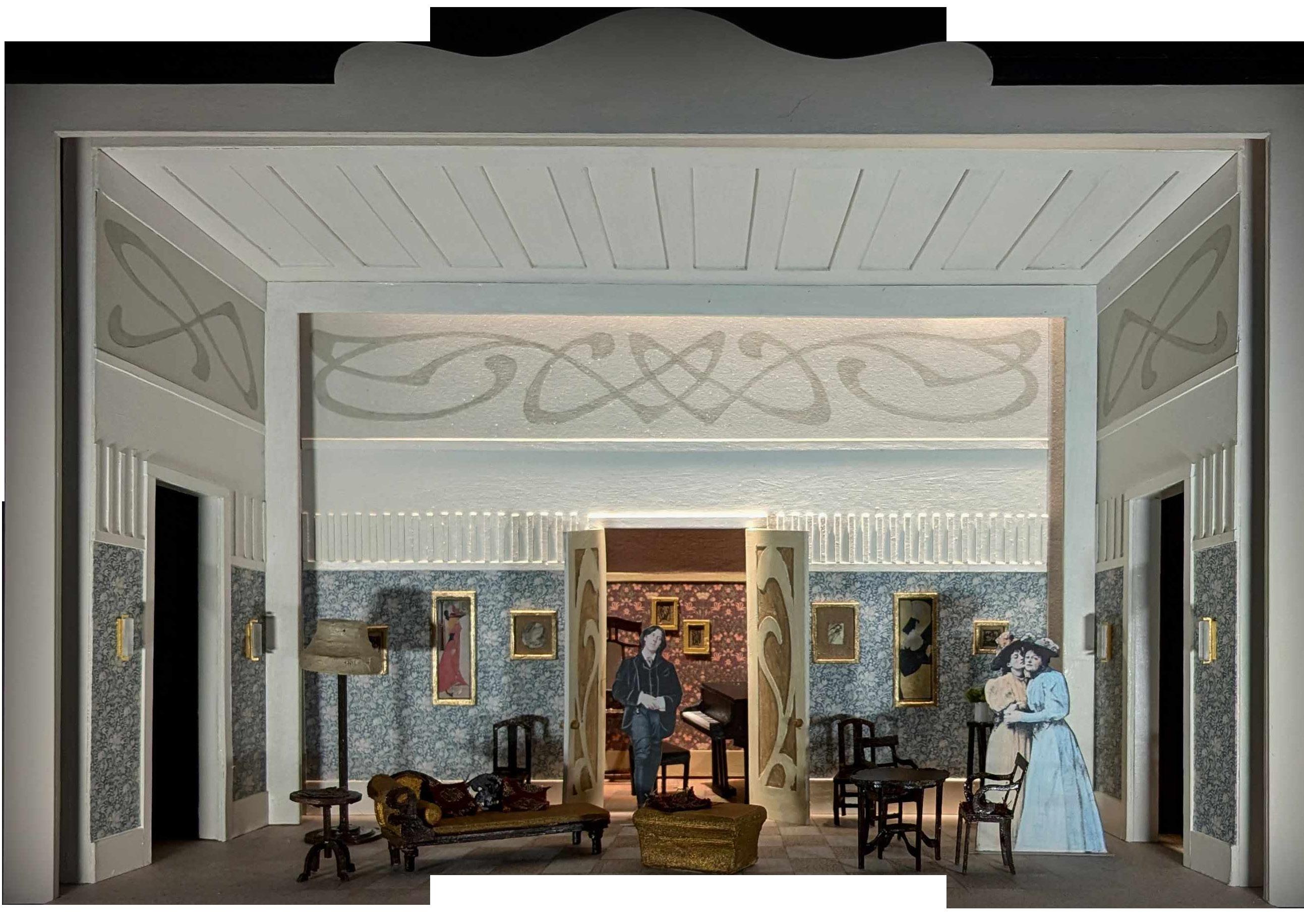
It’s always interesting to revisit a show more than once - I previously designed the set for Earnest at the Lyric in 2001; I also painted the set for a previous production here in 1990, and designed another version at the Bardic Theatre in 2023.
The Lyric production in 2001 was a touring show, so the set had to be reasonably compact - the different scenes were revealed with rotating panels and minimal changes of furniture - and the Lyric itself was a lot less well equipped back then, without a fly-tower and little backstage space.
The starting point for any design is usually the script, where you can get a lot of information about the location, period and other staging requirements that are helpful in the design process. The temptation in returning to a show several times is to approach it from different angles, maybe even to try something contrary for the sake of it.
Some plays adapt well to reinterpretation or modernization, but I think Earnest is probably not one of them. Each of my previous productions had different directors with their own ideas, but it’s telling that all of the designs have remained largely within the late 19th-century world in which the play was written.
This was a very rich period in the decorative arts, so there is much to be inspired by: the Arts & Crafts designs of William Morris and C.F.A. Voysey; the Japanese-influenced interiors of Charles Rennie Mackintosh; the sensuous curves of Art Nouveau; the Aestheticism of Whistler, Aubrey Beardsley and Oscar Wilde himself.
For this production I’ve used elements of all of these, whilst probably being faithful to none of them. My main aim was to produce something attractive to look at while you are being entertained, and which helps the world of the characters to come to life.
Stuart Marshall Set Designer


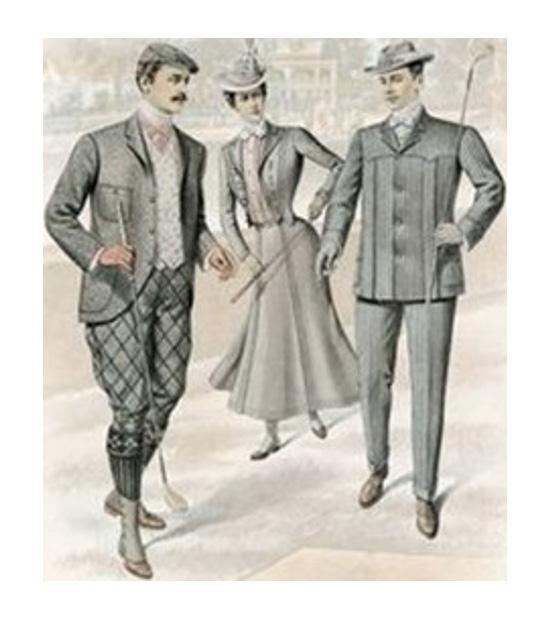
When I think of The Importance of Being Earnest I think of cucumber sandwiches and from there I daydream of cake and tea, English muffins, fondant fancies, macaroons, mint tea and cocktails - all the delights of a summer garden luncheon.
The Summer Paris fashion plates of the 1890’s are full of such colours for women. Even where those plates are in black and white, the descriptions will tell you the skirt is striped pink, the bodice is a floral mint green, the jacket is an embroidered
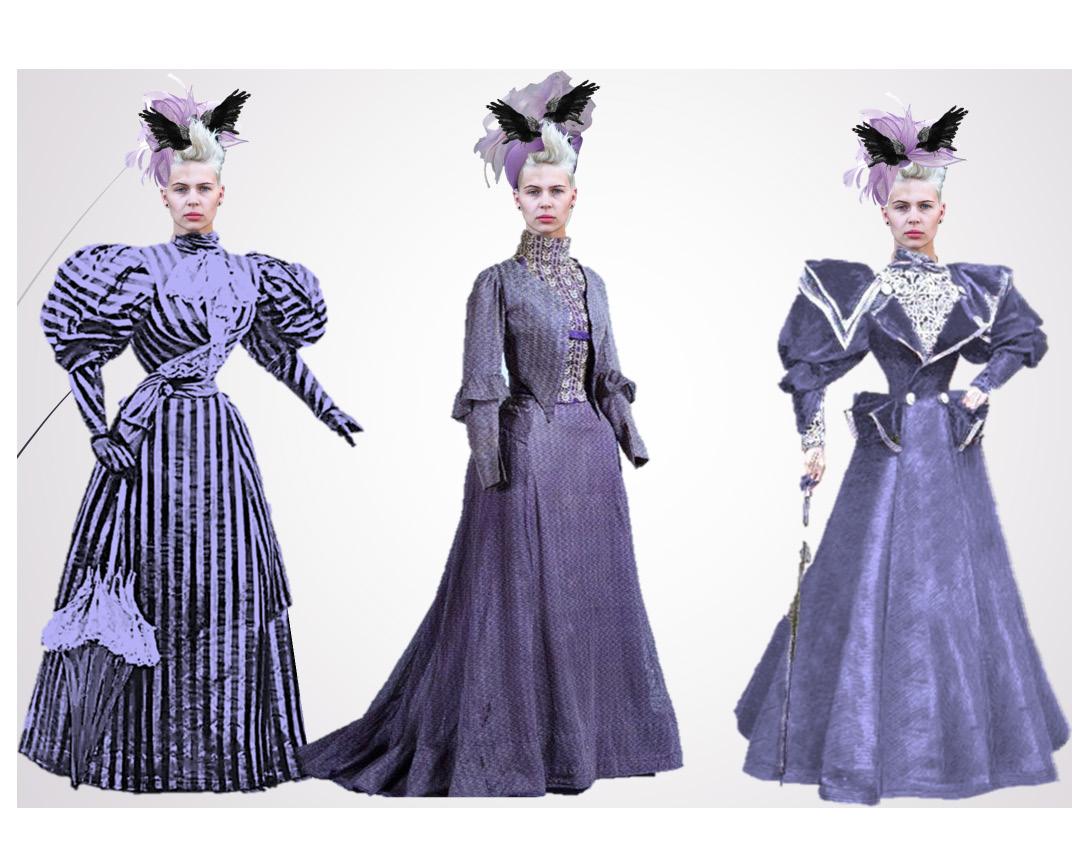
azure blue, a throwing together of colours and patterns intended to show ladies off to their summer best. And all this anchored on oversized sleeves, corseted waists and wide skirts.
By contrast, Victorian men were stuck on the slow march towards the constraints of the three-piece suit, with colours restricted to black and grey and navy blue. Only in the pursuits of leisure can we find some of that colour and lightness in menswear: boating stripes, cricket whites, swimming onesies and hunting tweeds.
So, in keeping with the whimsical nature of the play, I released the men from these costume constraints and rolled the colour palettes of
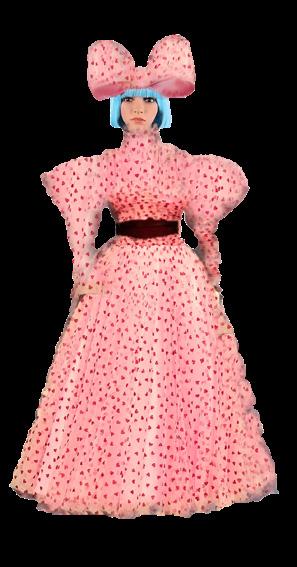
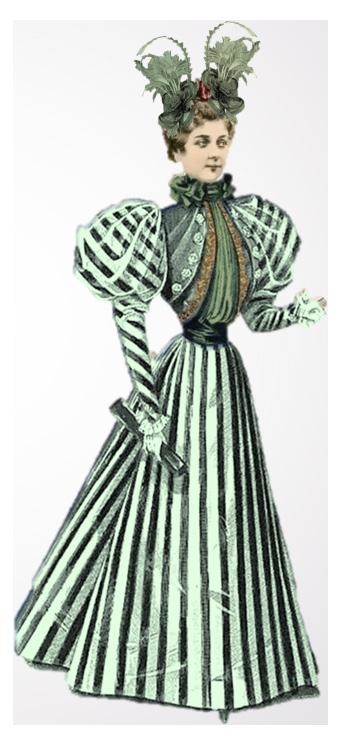
the women’s fashion plates across all of the men’s looks, eschewing the usual men’s formal wear for boating jackets and the usual tan or buff linens for colour, so the men get to peacock for a little while longer. Whilst the silhouettes are Victorian, there are anachronisms aplenty - this play demands irreverence in its affectionate teasing of the Victorian Upper Classes, in all their absurdity and grandiosity. The central plot is utterly preposterous, all difficulties fall away and are wrapped up in a neat bow at the end, but above all it is simply funny. My goal was to capture that playful satire in costume.
Catherine Kodicek Costume Designer
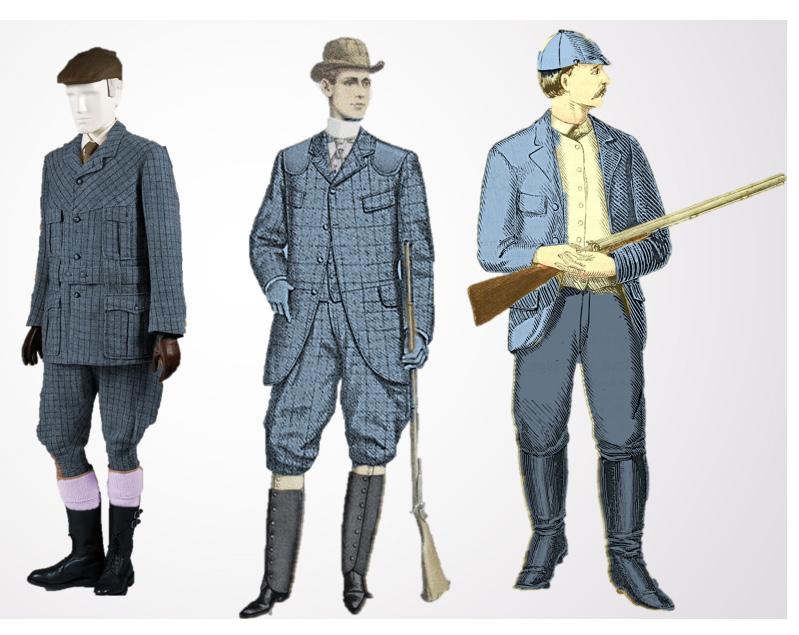


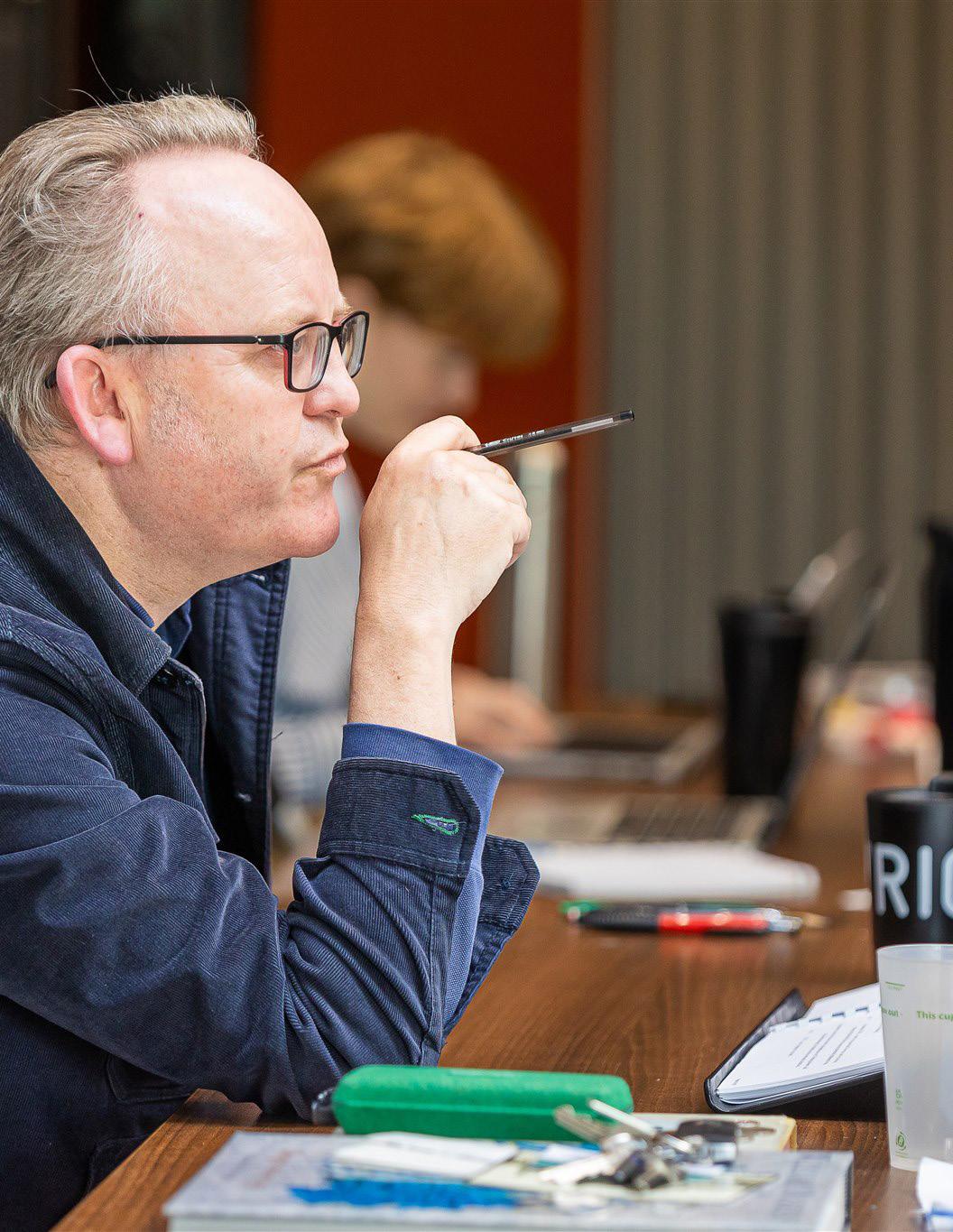

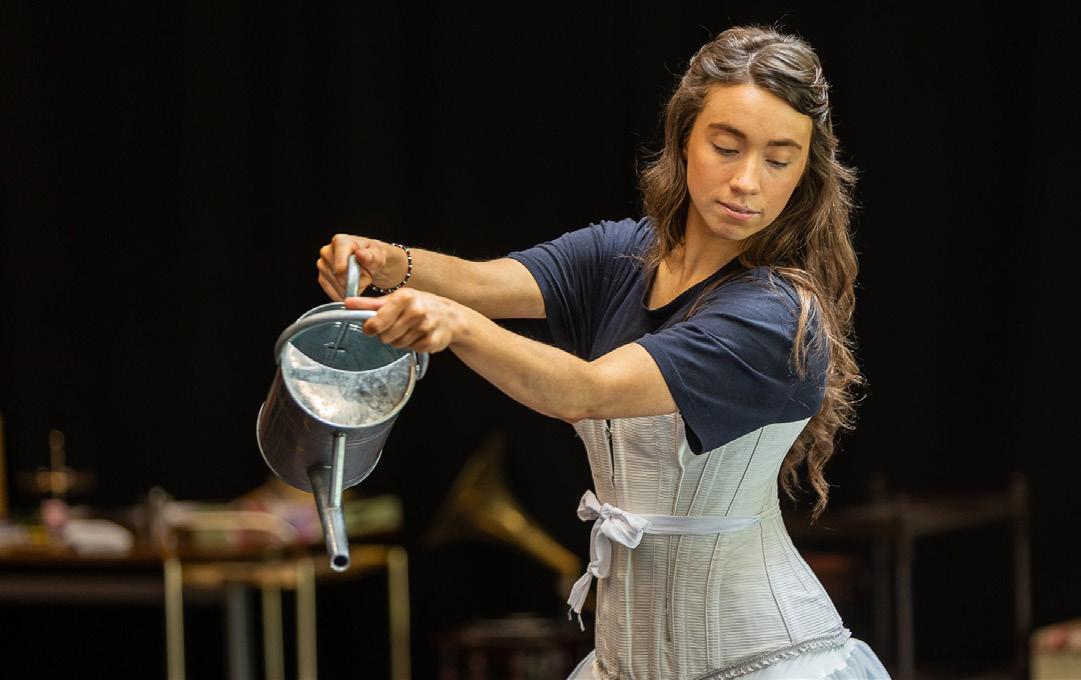
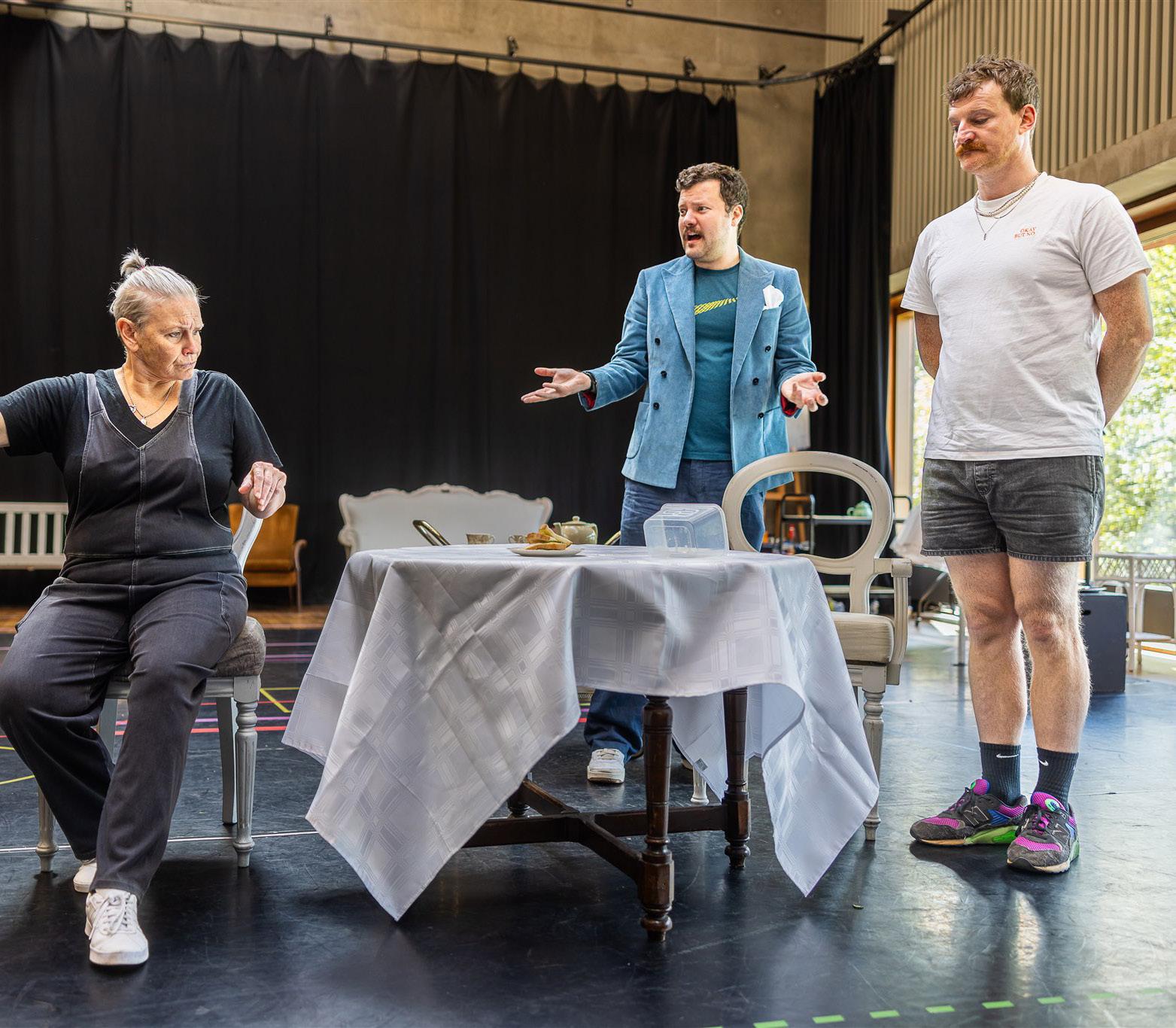
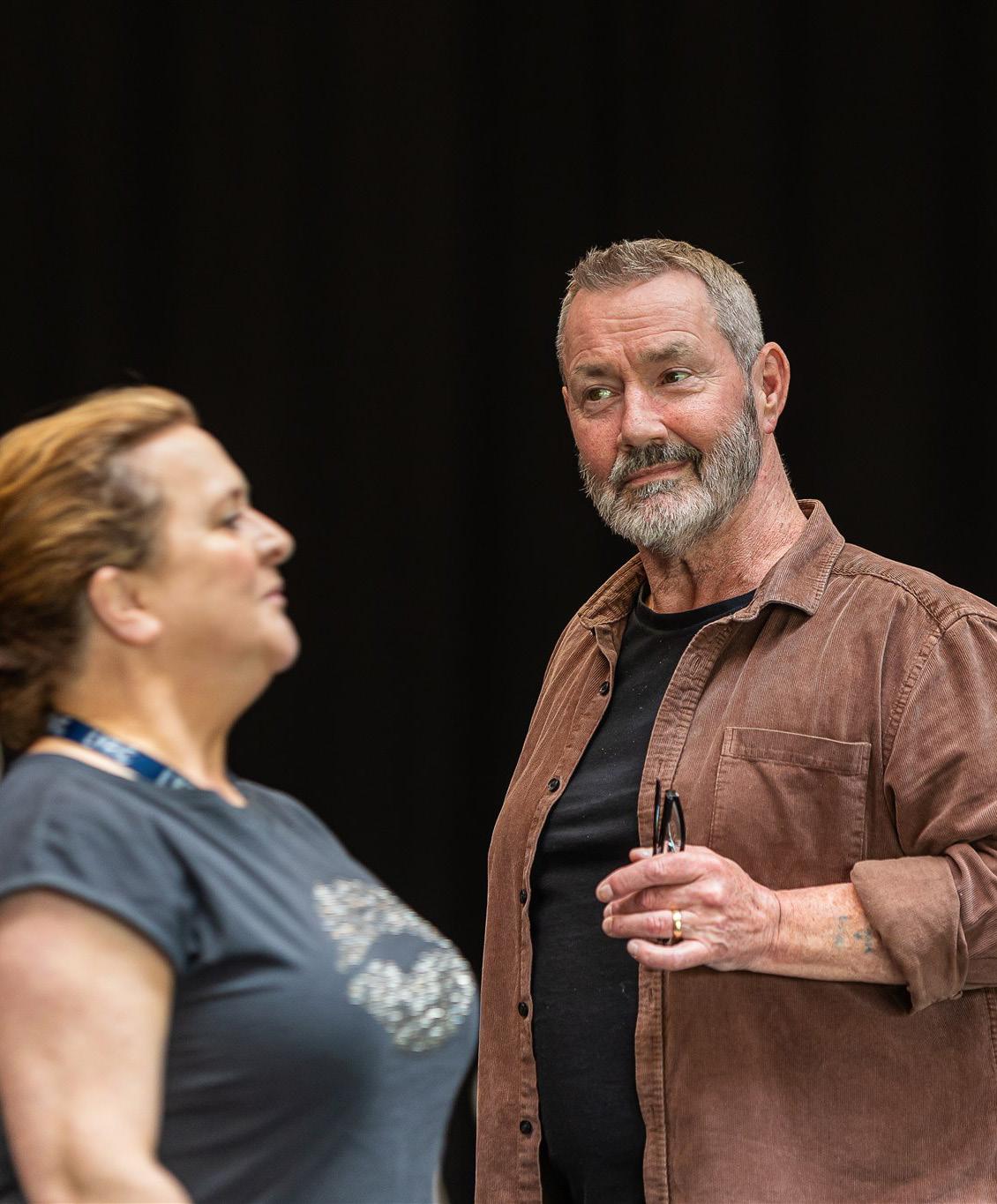
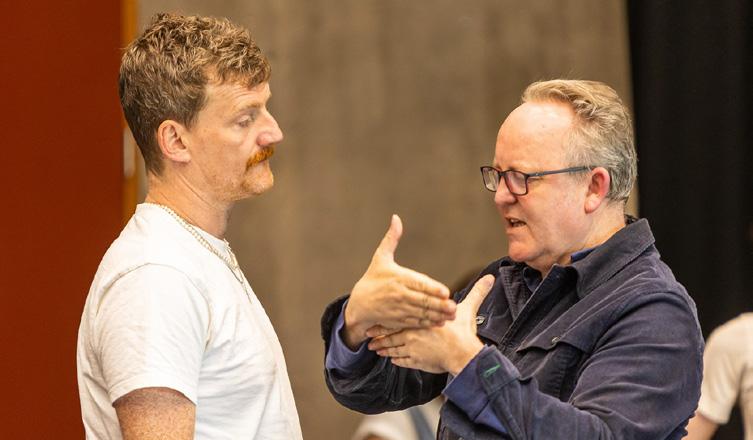
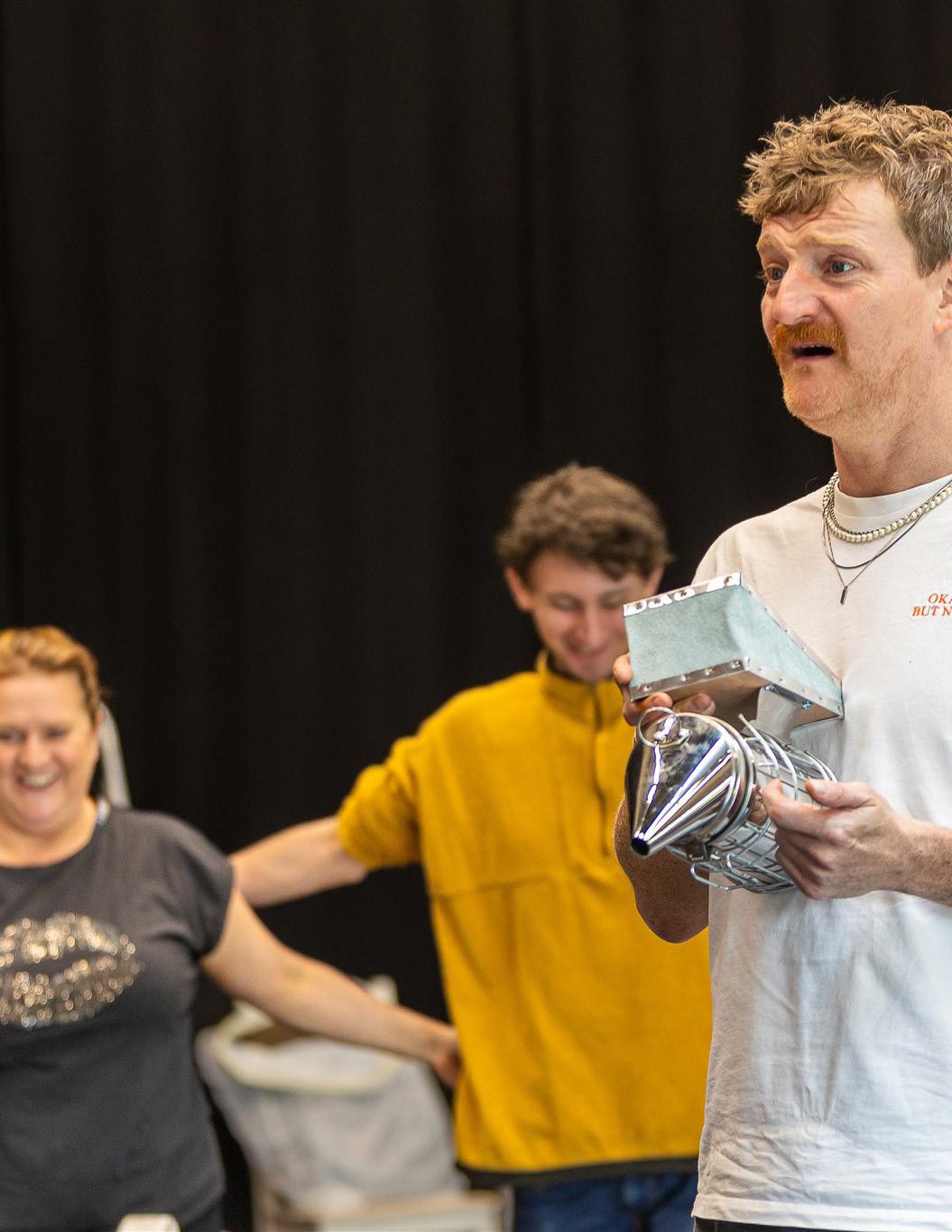

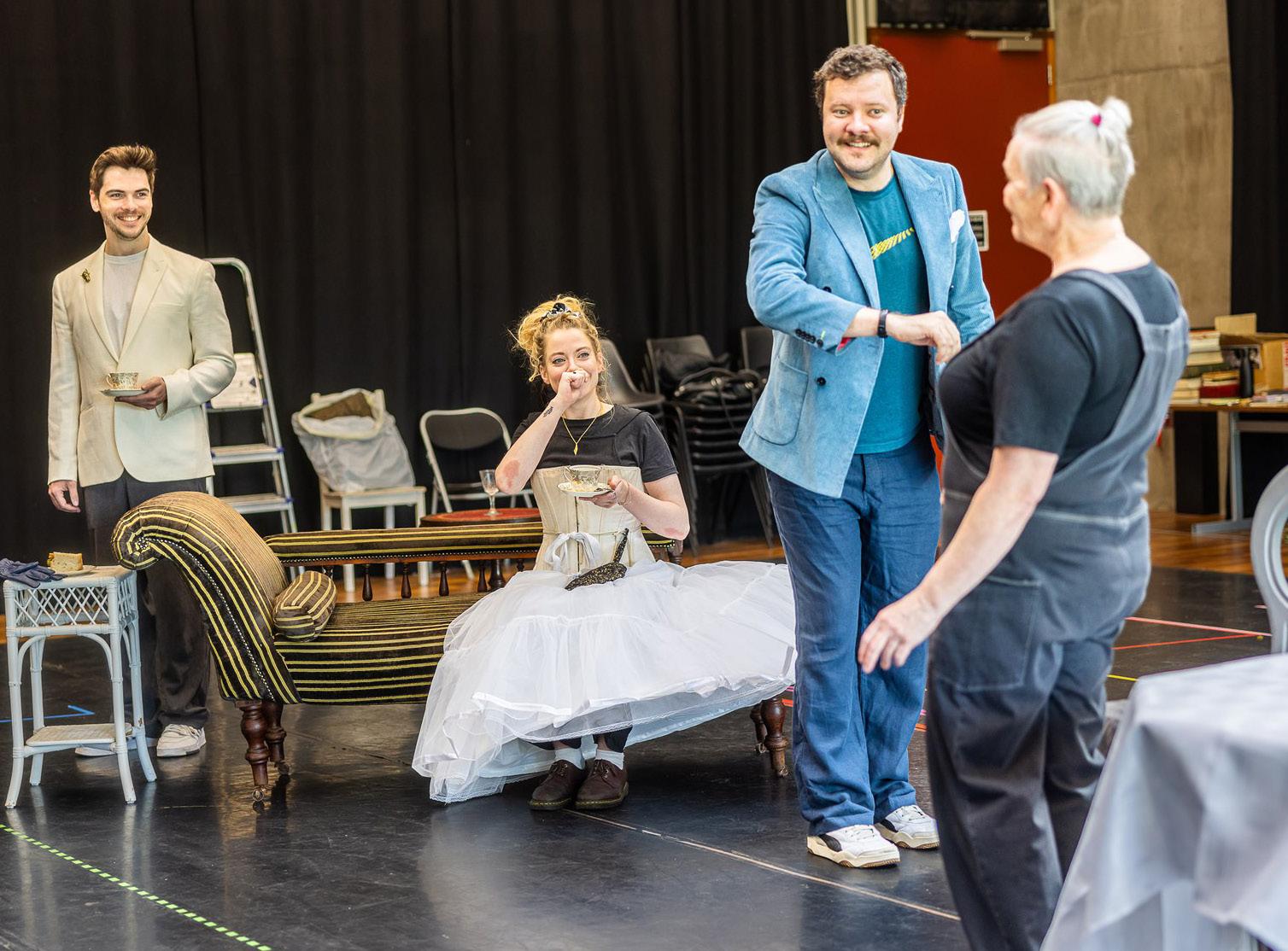


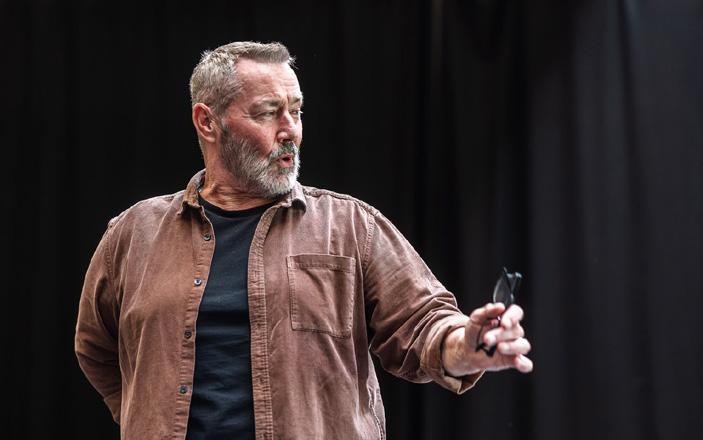
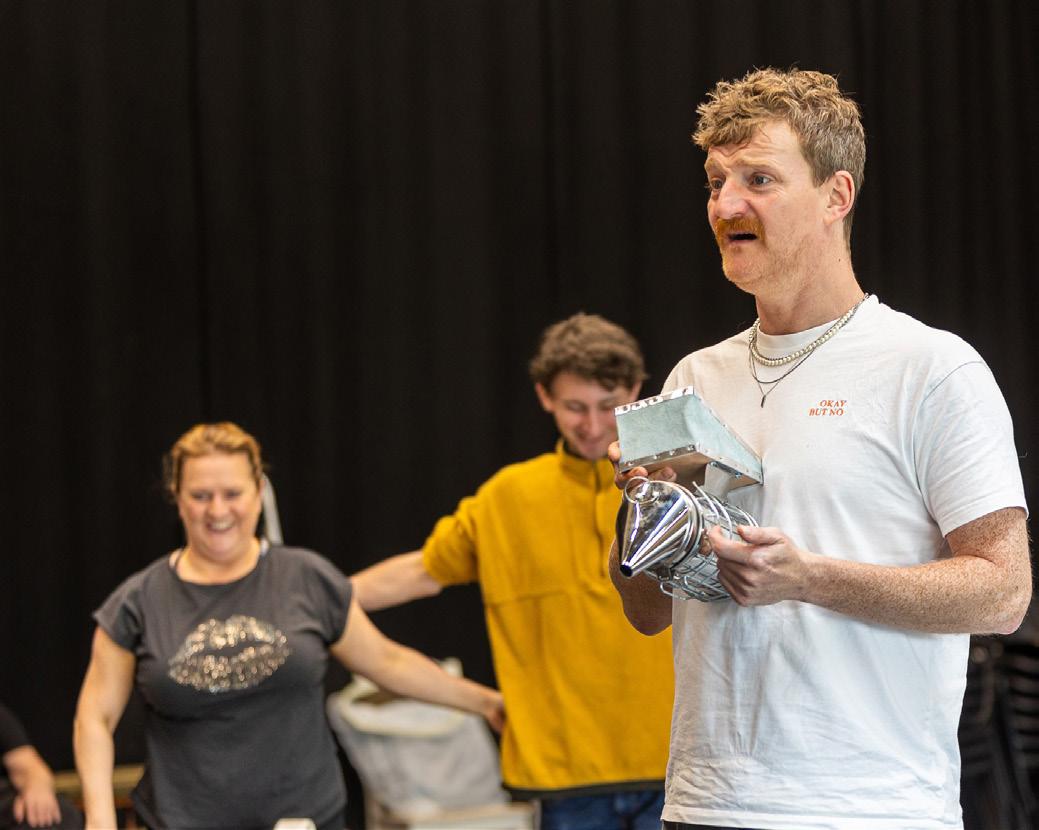
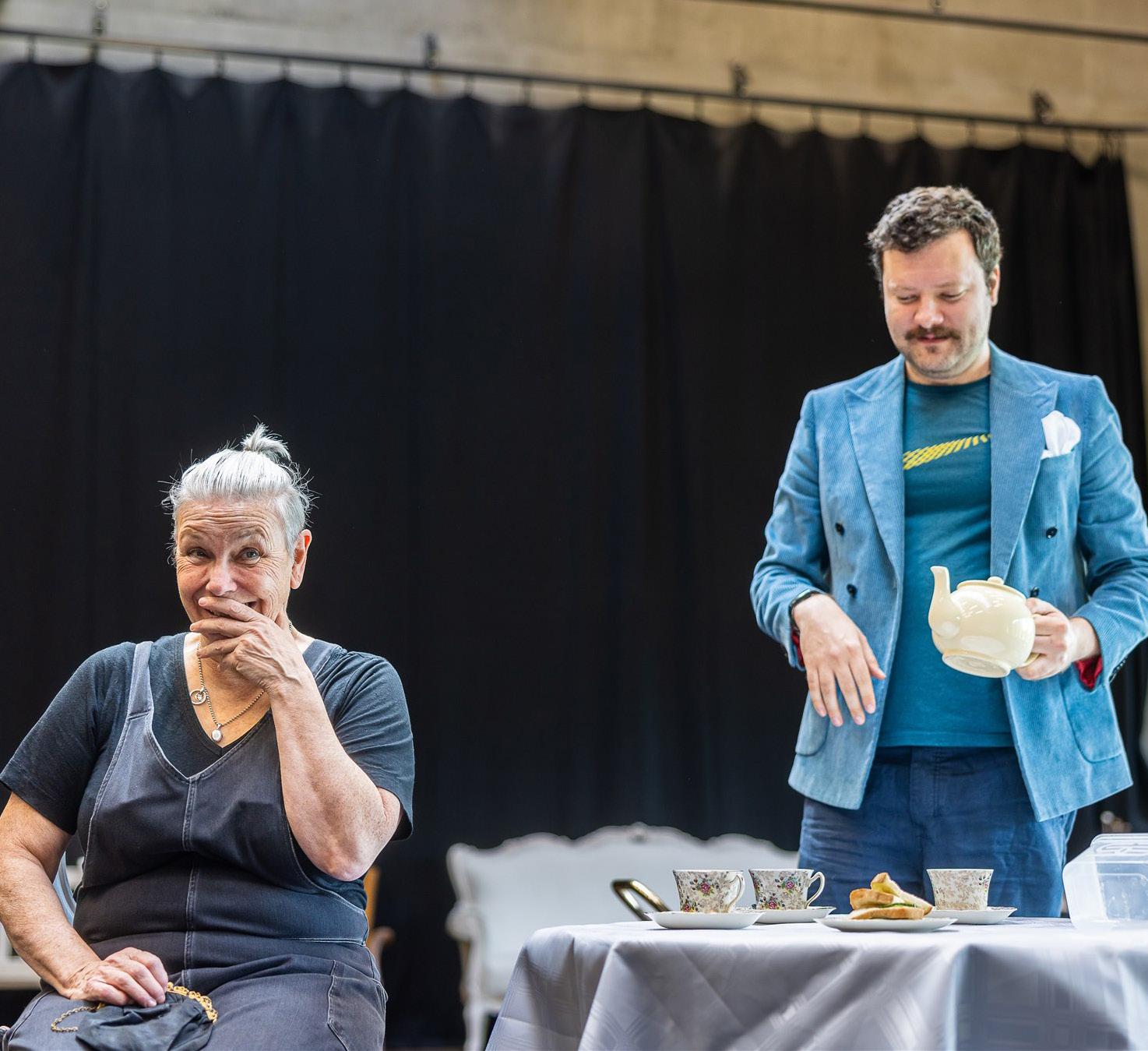

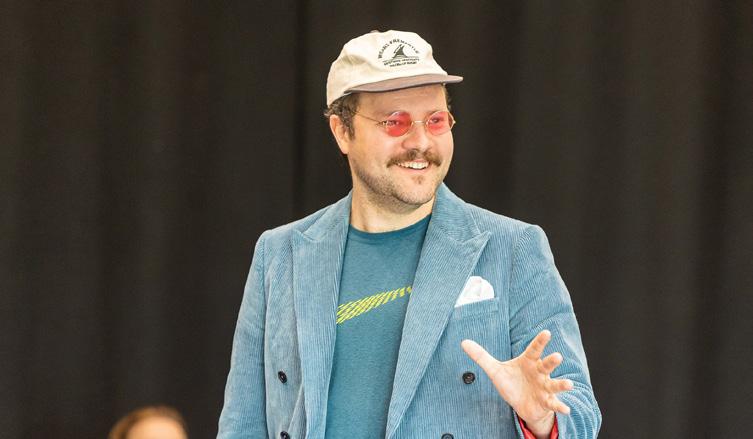

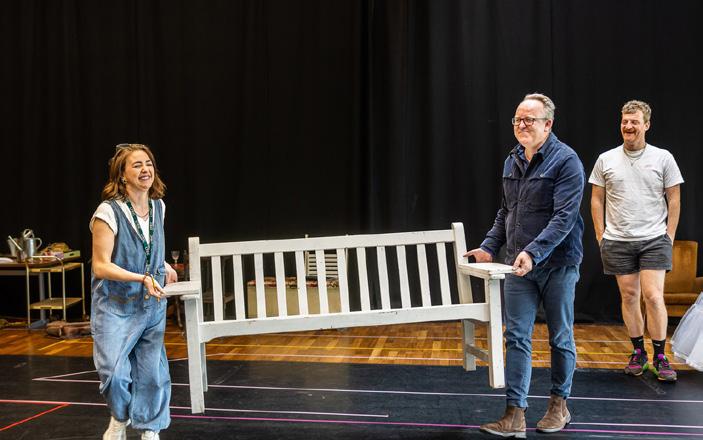
Miss Prism
John ‘Jack’ Worthing
Lady Bracknell
Cecily Cardew
Merriman & Lane
Rev Canon Chasuble
Algernon ‘Algy’ Moncrieff
Gwendolen Fairfax
Writer Director
Assistant Director
Set Designer
Lighting Designer
Costume Designer
Projection Designer
Composer & Sound Designer
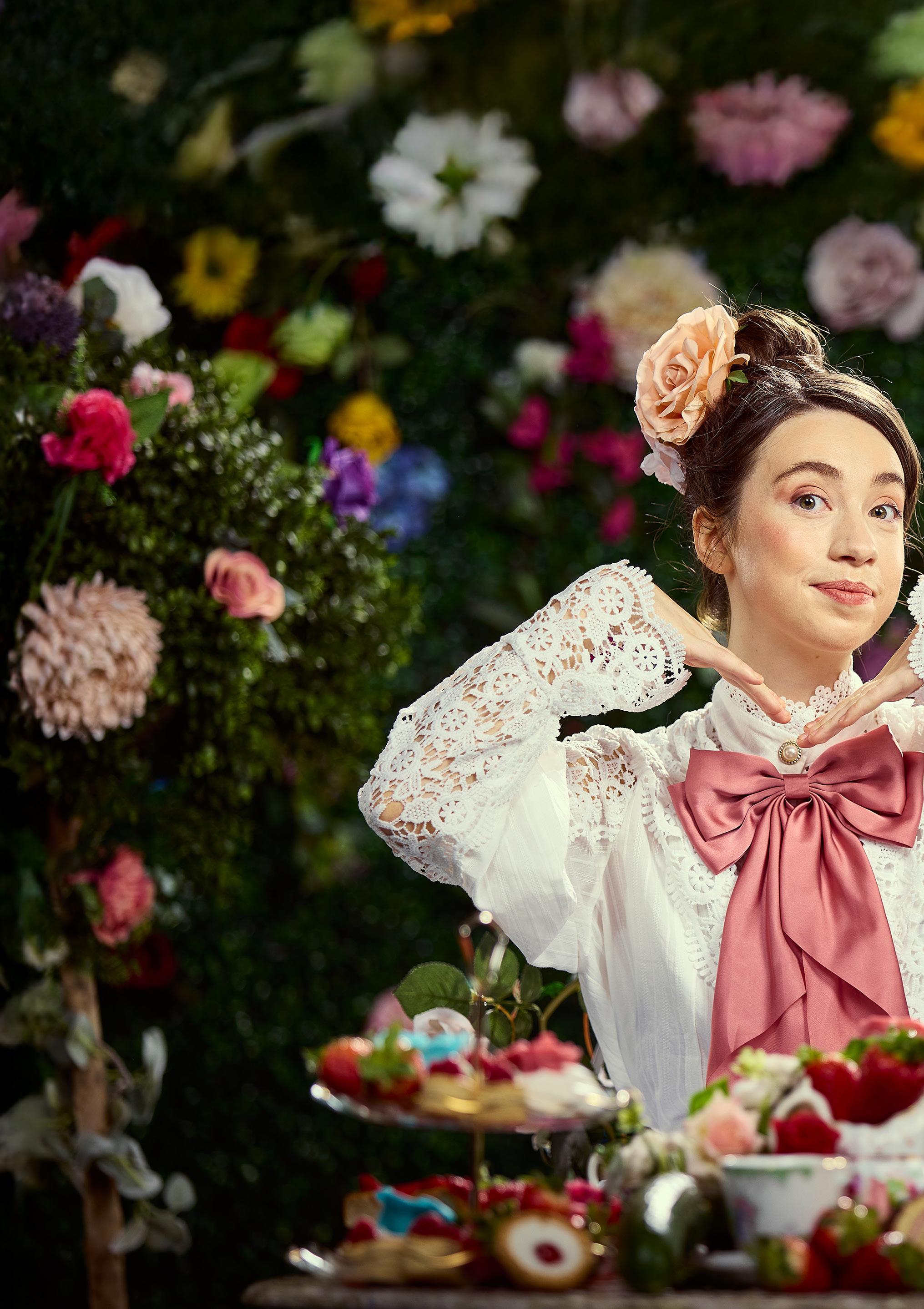
Jo Donnelly
Adam Gillian
Allison Harding
Calla Hughes Nic Aoidh
Neil Keery
Marty Maguire
Conor O’Donnell
Meghan Tyler
Oscar Wilde
Jimmy Fay
Debra Hill
Stuart Marshall
Mary Tumelty
Catherine Kodicek
Neil O’Driscoll
Garth McConaghie
Executive Producer
Senior Producer
Casting Director
Production Co-ordinator
Head of Production
Production Manager
Assistant Production Manager
Company Stage Manager
Deputy Stage Manager
Stage Managers
Assistant Stage Managers
Technical Manager
Senior Production Technician
Technicians
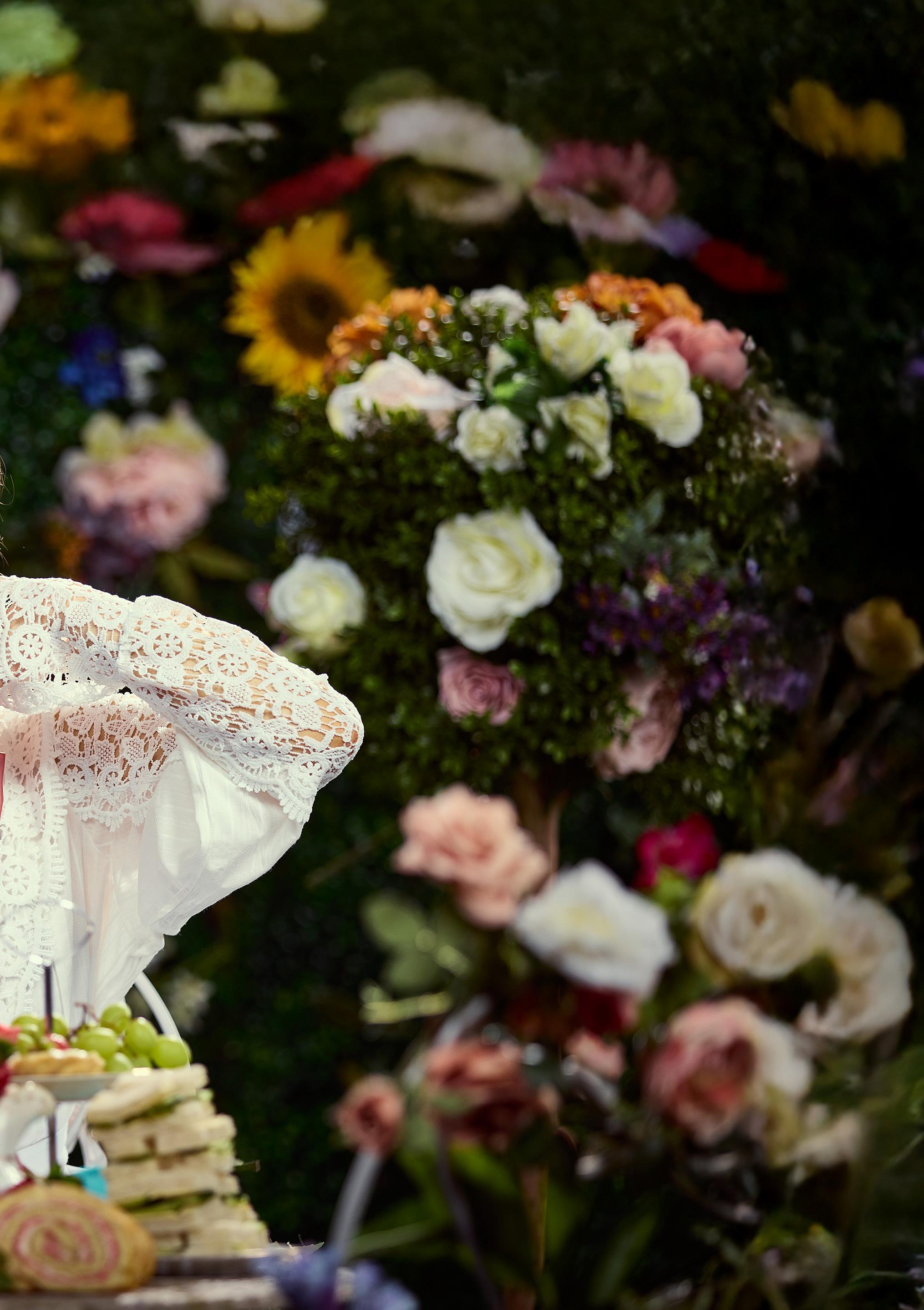
Chief Electrician
LX Programmer
Set Construction
Scenic Construction Manager &
Scenic Carpenters
Scenic Welder
Scenic Artist
Workshop Assistant
Trainee Scenic Carpenter
Costume Manager
Costume Supervisor
Costume Assistant
Costume Maker
Tailor
Hair & Make-Up
Costume - Work Placement
Photography / Videography
Public Relations / Press
McQuillan Rachael Harriott Communications

Jo Donnelly Miss Prism
Jo Donnelly trained at the Royal Academy of Dramatic Art.
Lyric Theatre credits: A Midsummer Night’s Dream; Little Women; Rough Girls; 1984; The Ladykillers; Forget Turkey; Demented; The Colleen Bawn; Re-energise (with Derry Playhouse).
Other Theatre credits: Reunion (Kabosh Theatre); Sex in the City Hall (Cheesy Grin Productions); Chronicles of Long Kesh (GBL Productions); Women on the Verge of HRT (GBL Productions); The Hen Do (GBL Productions); Ardnaglass on the Air (GBL Productions).
Film, TV and radio credits: How’s She Cuttin’? (BBC Northern Ireland); Give My Head Peace (Hole in the Wall Gang); The B-Team (BBC Studios); St Mungos (Long Story TV); A Good Woman is Hard to Find (February Films).
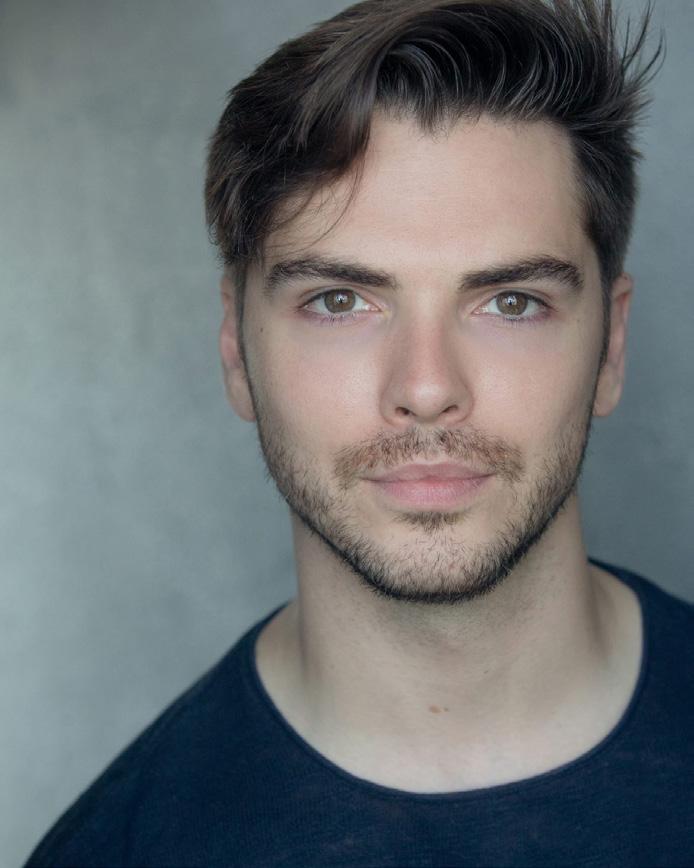
Adam Gillian John ‘Jack’ Worthing
Adam Gillian trained at the Royal Conservatoire of Scotland and the Institute of Contemporary Music Performance.
Lyric Theatre credits: Romeo and Juliet.
Other Theatre credits: Hadestown (National Theatre); Beautiful: The Carole King Musical (UK/IRE Tour); Moulin Rouge! The Musical (Piccadilly Theatre, Original West End Cast); Aladdin (Marketplace Theatre, Armagh); Belfast Actually (The Theatre at the Mill).
Film, TV and radio credits: Counsel; Doctors; Hope Street; Pan Tau; How’s She Cuttin’? (BBC Northern Ireland); Copy That (Causeway Pictures); The Painted Lady (Rachel Coffey Pictures); The Magic Spade (Causeway Pictures); The Tale of The Whispering Woods (Dark Faith Productions); Pills (What’s Next? Films).
Adam thanks the Andrew Lloyd Webber Foundation for their support.
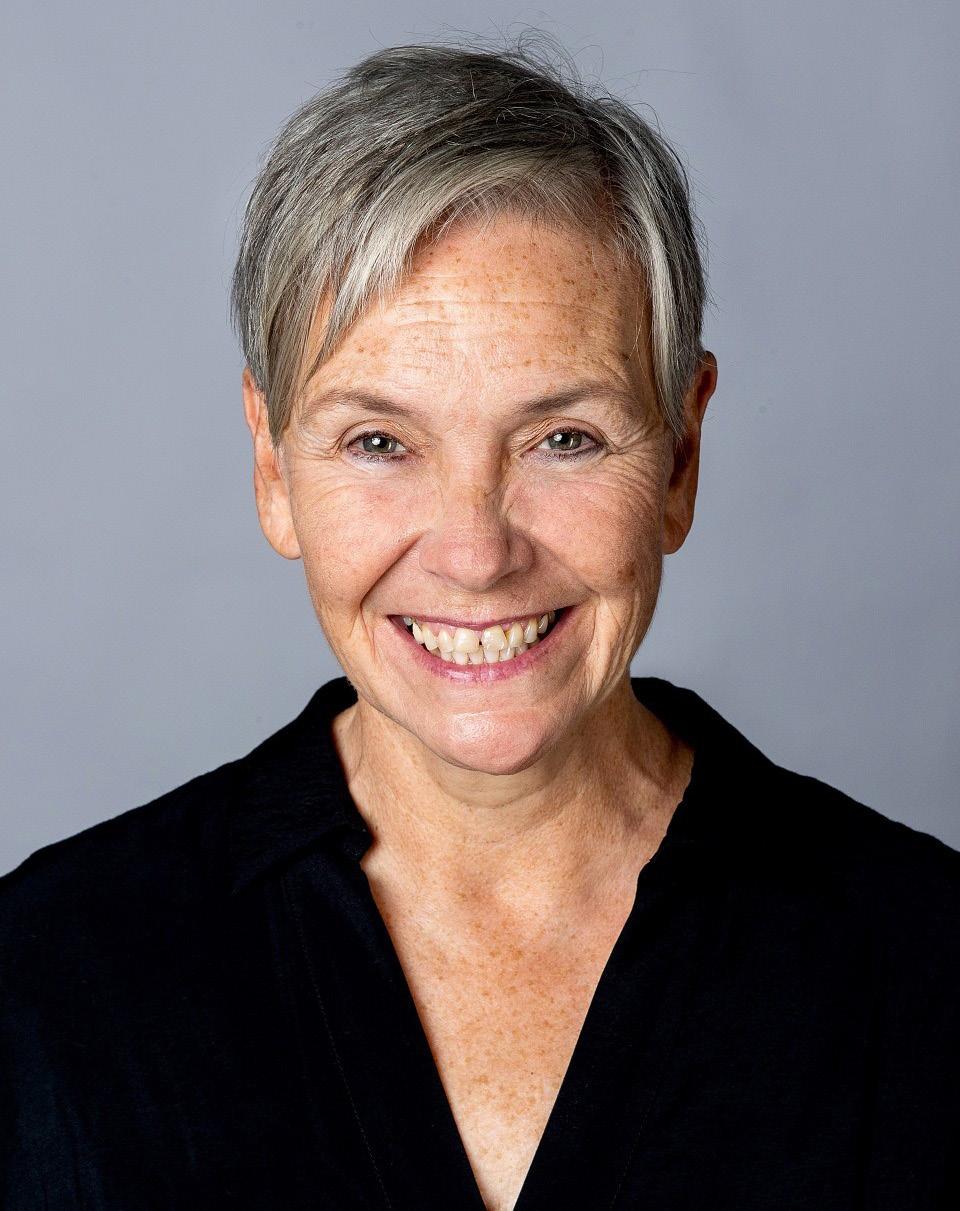
Allison Harding Lady Bracknell
Lyric Theatre, Belfast: Allison first appeared at the Lyric in 1995 as Nancy in Oliver! and has since played Swallowfire in Pinocchio; Queen of Hearts in Alice the Musical; Captain Jess Hook in Peter Pan; Aunt March in Little Women; Duchess of York in Richard III; Ralph in Kiss Me Kate; Ruth in The Pirates of Penzance; Skin Horse in The Velveteen Rabbit
Other Theatre Credits: Into the Woods, Follies (NI Opera); Return to the Forbidden Planet, From Jack to a King, Sister Act, Once (West End). Tours include Sister Act, The Girls, Forbidden Planet, From Jack to a King, Blonde Bombshells of 1945
Film Credits:
Beauty and the Beast (Disney); Mamma Mia: Here We Go Again; Old Friends and Other Days; There There.
Television Credits: The Bill; London’s Burning; Nova Jones; Dalgliesh; Malpractice; Ellis (Channel 5); Avonmore Milk commercial.
Awards:
Olivier Award (Return to the Forbidden Planet); Irish Times Theatre Award (Into the Woods).
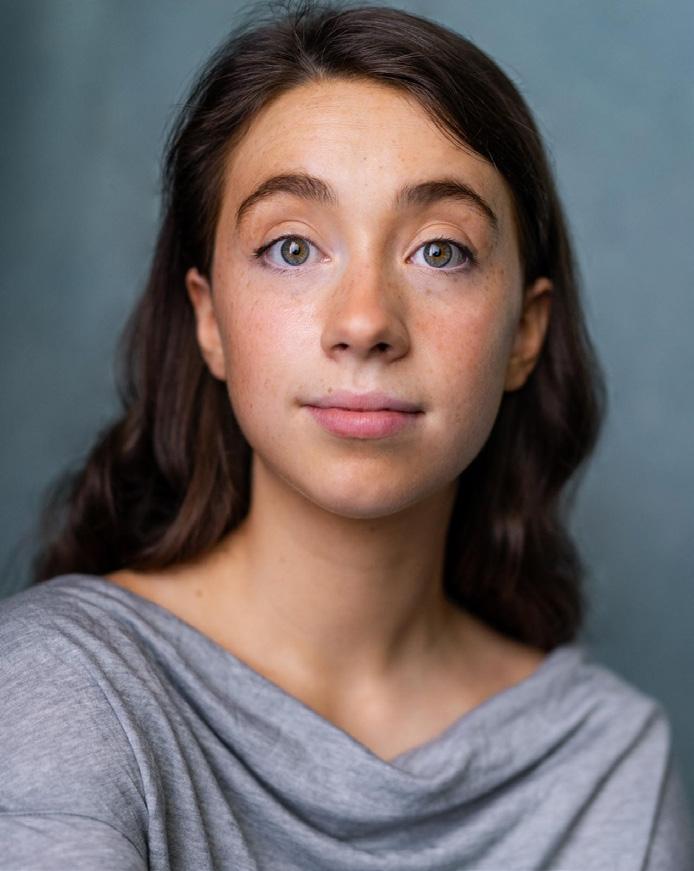
Calla Hughes Nic Aoidh Cecily Cardew
Calla Hughes Nic Aoidh is from Newry and trained at Italia Conti Arts Centre in London.
Lyric Theatre credits: The Snow Queen (as Gerda).
Other Theatre credits: Shakespeare’s Women (Commedia of Errors); I Am Maura (Commedia of Errors); Mary Ann, The Forgotten Sister (Kabosh Theatre); Tribe (Replay Theatre Company).
Film, TV and radio credits: How To Get To Heaven From Belfast (Hat Trick Productions/ Netflix); Last Night’s Leftovers (short film, NI Screen).
Workshops and readings: Homo Hibernicus (Rough Magic); Pentecost (Rough Magic).
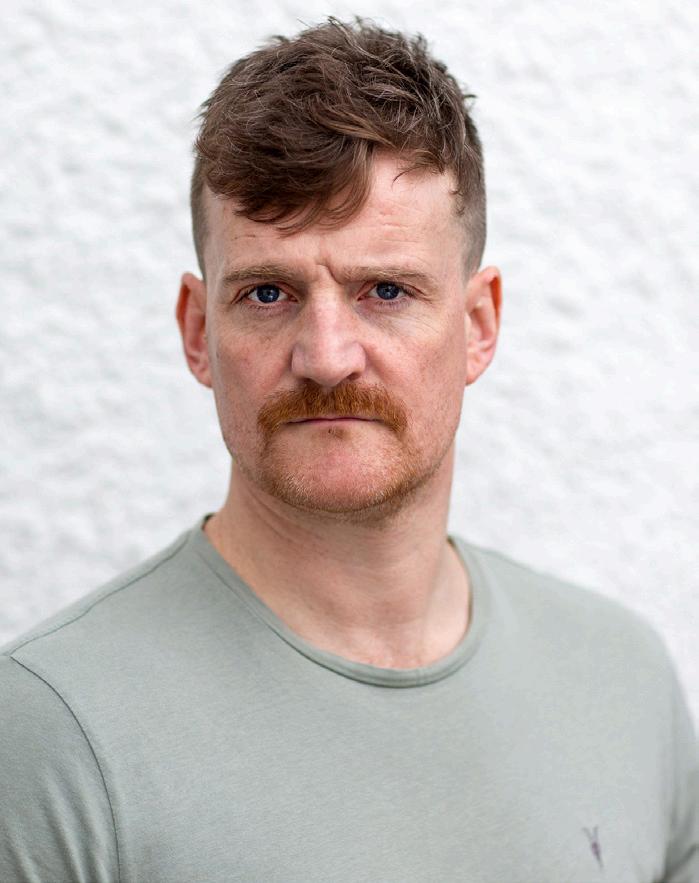
Neil Keery Merriman / Lane
Neil Keery is an actor, director and writer; born, bred and currently living in Belfast.
Lyric Theatre credits: A Midsummer Night’s Dream; Jazzabelles (Skinnybone); Notorious (Spanner in the Works)
Other Theatre credits: It Was Easy in the End (THEATREclub, Abbey Theatre); It’s Not Over (THEATREclub, Beckett Theatre); What/Where (Kabosh, Beckett Festival); Cinderella, Aladdin (GBL Productions, Waterfront); Diablo (Spanner in the Works, Canadian Tour/Edinburgh Fringe).
Directing credits: Grease; Spamalot (Ulster Operatic Company, Grand Opera House); The Drowsy Chaperone; 9 to 5; I Love You, You’re Perfect, Now Change (Newcastle Glees, Annesley Hall); Jazzabelles (Skinnybone, Lyric Theatre).
Film, TV and radio credits: Blue Lights (BBC, as Sgt. McCloskey); Emmerdale (ITV); The Woman in White (BBC); Vikings (Amazon); Game of Thrones (HBO).
Writing credits:
The People’s Panto – Cinderella, Sleeping Beauty and Snow White (Brassneck Theatre Company), in which Neil also stars as the Dame, Fairy Upliquid.
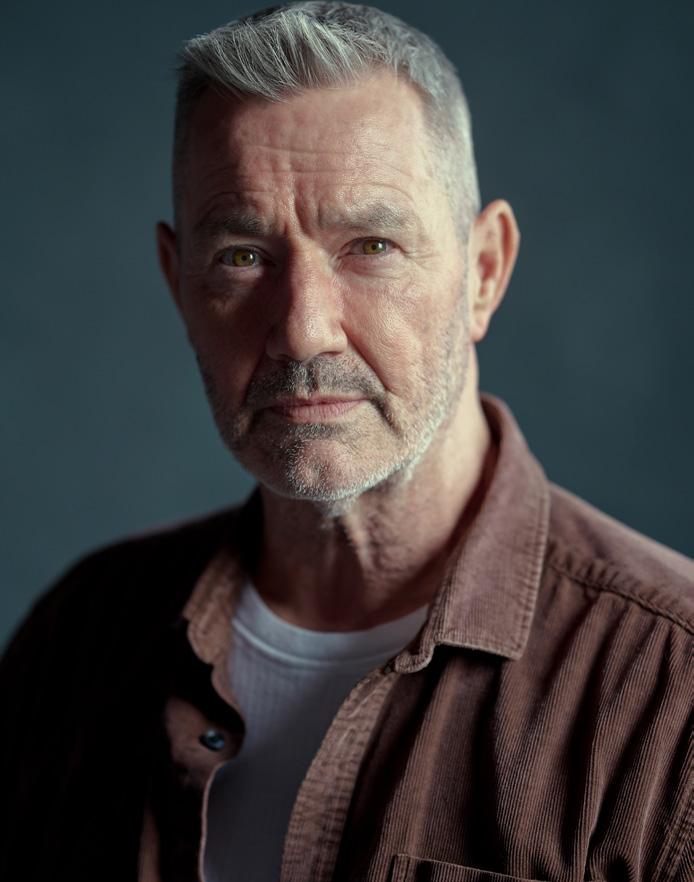
Marty Maguire Rev Canon Chasuble
In a career spanning 40 years, Marty Maguire’s most recent theatre credits include:
Lyric Theatre credits:
Kiss Me Kate; The Weir; Dockers; Philadelphia, Here I Come; Weddins’, Wee’uns and Wakes; Mixed Marriage; A Christmas Carol (2024 - as Jacob Marley and others, directed by Matthew McElhinney).
Other Theatre credits:
The Chronicles of Long Kesh (Belfast Opera House); Give My Head Peace Stage Show (Opera House & Northern Ireland Tour); Good Vibrations (Opera House & Irish Arts Centre, New York); History of the Troubles (According to My Da!!) (Opera House & NI Tour); Angela’s Ashes: The Stage Musical (Opera House & Irish/UK Tour); The Shop at the Top of the Town (Theatre at The Mill); Bouncers (The MAC Theatre); Crazy (Opera House & The MAC); The Sweety Bottle (Opera House);
Film, TV and radio credits:
Kneecap (as Interrogating Officer Nesbitt); Faith of Our Fathers (Netflix); The Boys from County Hell (Netflix); Winged Creatures (aka Fragments).
TV: The Puzzle Lady; Hope Street; Give My Head Peace; Three Families; The Fall; Paula; Vikings; Number 2’s (BBC Northern Ireland).
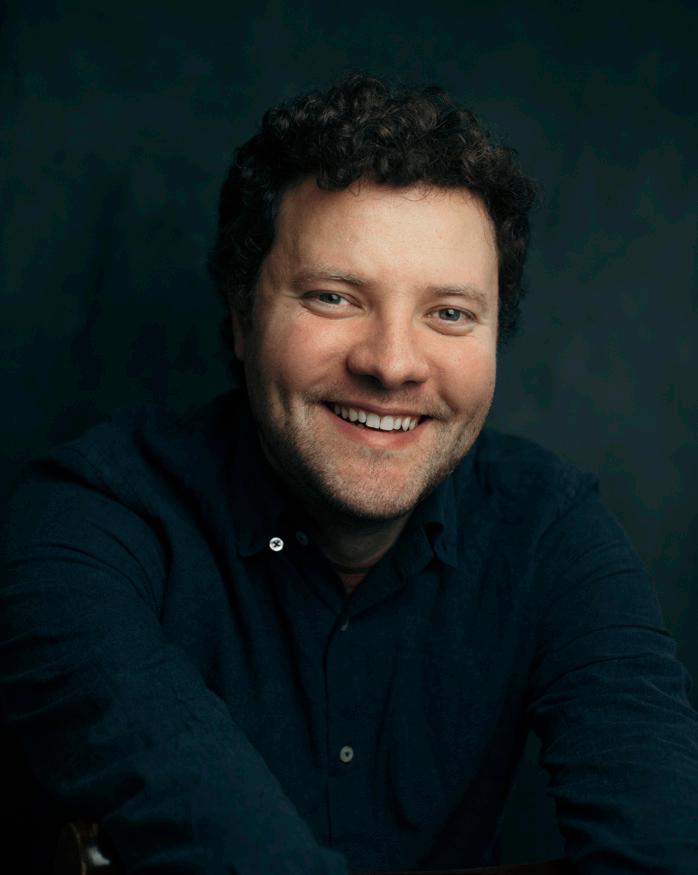
Conor O’Donnell Algernon ‘Algy’ Moncrieff
Conor O’Donnell is an actor from Belfast who trained at Bow Street Academy in Dublin 2018. Conor has an impressive and growing body of work across stage and screen.
Other Theatre credits:
Aurora (The MAC, Belfast); Removed (The MAC, Belfast) which toured the USA, Australia and Europe; Carson and The Lady (Theatre at The Mill - as Thomas Ballantine and Evan Morgan, 2021 & 2022).
Film, TV and radio credits:
Call the Midwife – Christmas Special and two other episodes (BBC, as Roger Noble); Say Nothing (Disney FX, as Eamon); Blue Lights (BBC, as CID Officer Conor James); The Heist Before Christmas (Feature Film, 2023); Nova Jones (CBBC); Derry Girls (Channel 4).
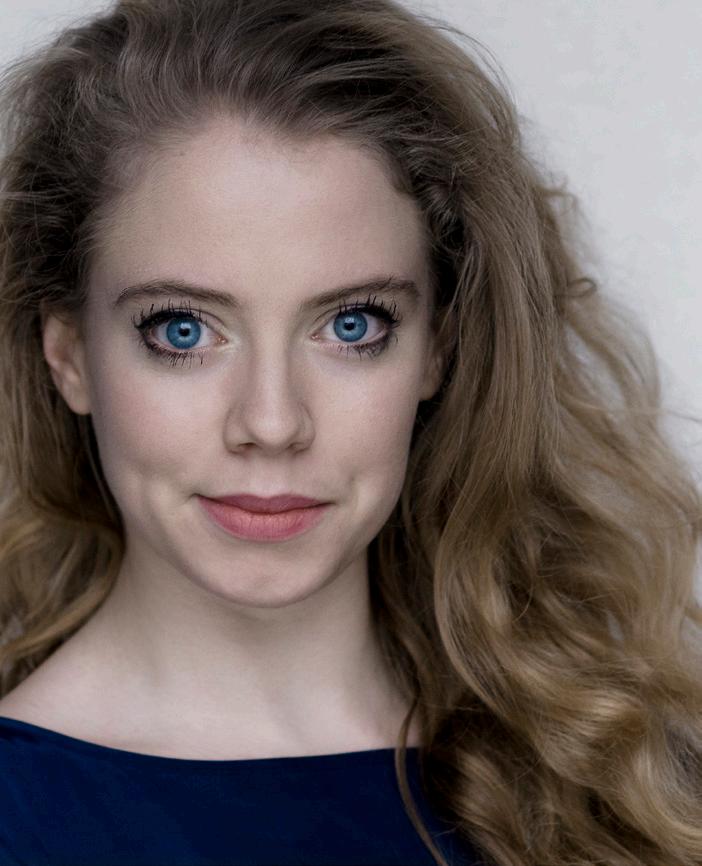
Meghan Tyler Hon. Gwendolen Fairfax
Meghan is an actor and writer, born in Newry and based in Glasgow. They trained at the Royal Conservatoire of Scotland.
Lyric Theatre credits: A Midsummer Night’s Dream, The Gap Year, A Streetcar Named Desire, Crocodile Fever.
Other Theatre credits:
Aurora (Prime Cut); Pride and Prejudice (Sort Of) (West End & UK Tour); Variant; The Persians; The Weir Sisters (A Play, A Pie and A Pint); Medicine (Off The Middle/ The Hope Theatre); The Merchant of Venice (Shakespeare’s Globe); The Crucible (Royal Lyceum, Edinburgh); A Midsummer Night’s Dream, Two Gentlemen of Verona (Guildford Shakespeare Company); Hamlet (Citizens Theatre, Glasgow); Secret Show 1 (Blood of the Young/ Tron); Lovers, Look Back in Anger (Cumbernauld Theatre); Nothing to be Done (Setkani/Encounter).
Film, TV & Radio credits: Hope Street (BBC/BritBox); Almost Never (BBC); Shetland (BBC/ITV); Shrapnel (GMAC Film); Ballywalter (Empire Street Productions).
Awards & Recognition:
Meghan received the Channel 4 Playwrights’ Bursary and a New Playwrights Award in 2019, and won the Stewart Parker Award for Crocodile Fever. They were a writer on the Lyric’s New Playwrights Programme and won the Broadway World Ireland Award for Helena in A Midsummer Night’s Dream

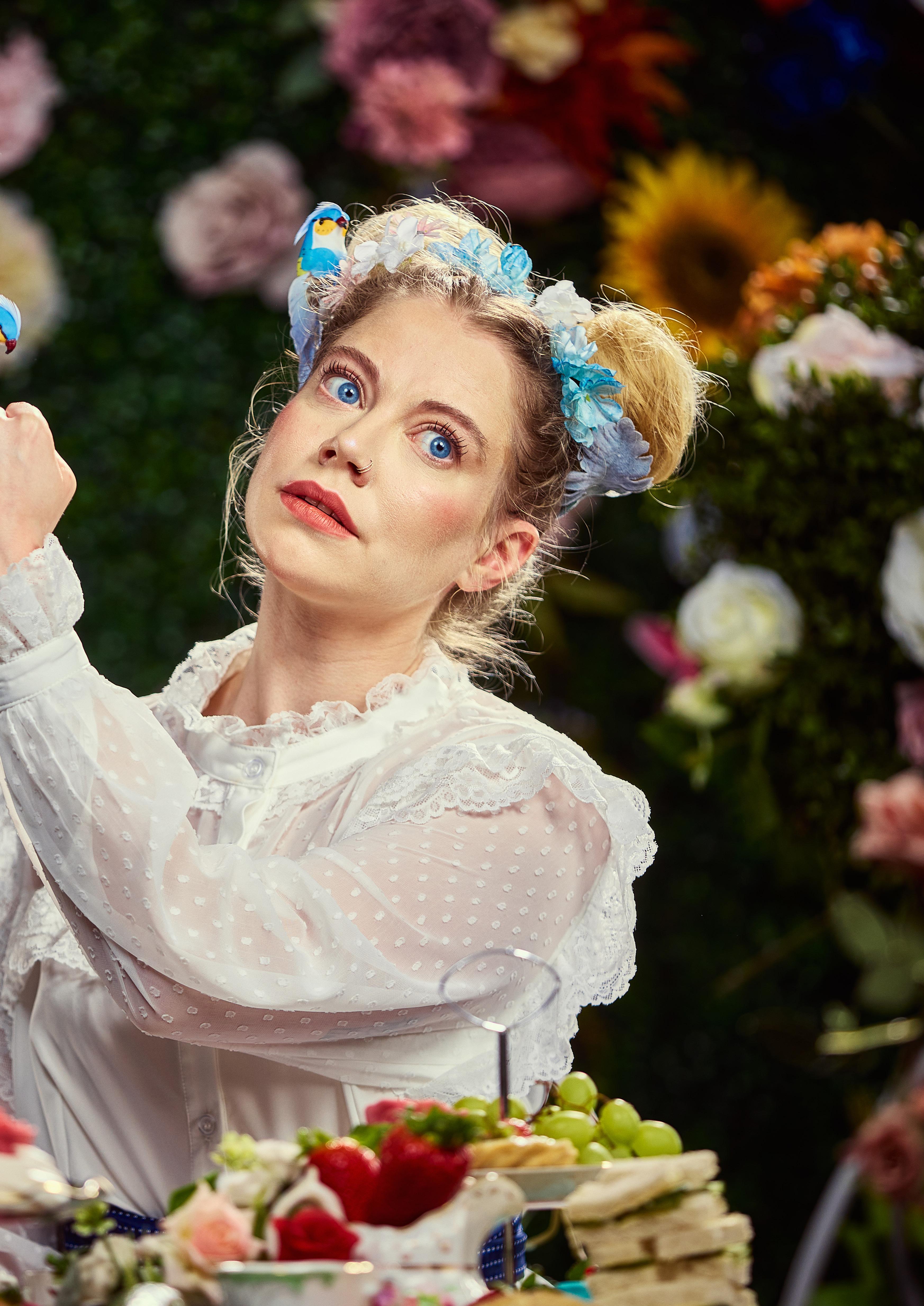
Jimmy Fay Director
Jimmy Fay is the Executive Producer and Artistic Director of the Lyric Theatre, Belfast.
Jimmy is a former acting Literary Director of the Abbey Theatre where he was also an Associate Director and Staff Director.
He formed his own company Bedrock Productions in 1993 which he ran until 2010. He co-founded the Dublin Fringe Festival in 1995 and was its first Director in 1995 and 1996.
His directing credits include: Blasted by Sarah Kane; Faraway by Caryl Churchill; East by Stephen Berkoff; Night Just Before the Forest, Quay West and Roberto Zucco by Bernard Marie Koltes; Quartet by Heiner Muller; Deep Space by Alex Johnston; This is Our Youth by Kenneth Lonergan and he curated Electroshock, a Theatre of Cruelty Season all for Bedrock at the Project Arts Centre.
For the Lyric: Pentecost by Stewart Parker, Double Cross by Tom Kilroy, Here Comes the Night by Rosemary Jenkinson, The Ladykillers by William Rose and Graham Linehan, St Joan by George Bernard Shaw, True West by Sam Shepard; Burnt Out by Gary Mitchell and most recently A Midsummer Night’s Dream by William Shakespear.
For Tinderbox: The Chairs by Ionesco adapted by Owen McCafferty, and was part of the directing team on Convictions at the Crumlin Road Court.
For Abbey Theatre - A School for Scandal by RB Sheridan; The Resistible Rise of Artuo Ui by Brecht; Saved by Edward Bond; True West, Curse of the Starving Class and Ages of the Moon by Sam Shepard; Playboy by Bisi Adigun and Roddy Doyle; A Government Inspector by Gogol adapted by Roddy Doyle; MacBeth and Henry 4 by Shakespeare; Melonfarmer by Alex Johnston; At Swim Two Birds by Flann O’Brian.
For Arambe Productions: The Gods Are Not to Blame by Ola Rotimi (codirected with Bisi Adigun) .
For Landmark Productions: The Last Days of the Celtic Tiger; Between Foxrock and a Hard Place; Breaking Dad and Postcards from the Ledge by Paul Howard
For Bickerstaff Comedians by Trevor Griffith; Rap Eire by Des Bishop and Arthur Riordan.
He won the Irish Times Directors Award in 2007. The Lyric won the The Stage’s Theatre of the Year, 2023.
Jimmy serves on the board of the Tyrone Guthrie Centre, a retreat for artists in Annaghmakerrig, Co. Monaghan.
Debra Hill
Assistant Director
Debra is an actor, assistant director, director of youth theatre, and drama facilitator/chaperone based in Northern Ireland. She trained at The Rainbow Factory School of Performing Arts, gained her Grade 8 Diploma in Musical Theatre from London College of Music, completed a BA in Drama at Queen’s University Belfast, and trained at The Acting Studio School in New York City.
Lyric Theatre credits: Little Women; A Midsummer Night’s Dream; Richard III; Our New Girl; The Importance of Being Earnest.
Other Theatre credits: 10 years of pantomime (GBL Productions); Belfast Actually (Leesa Harker Productions); Hollow (Replay Theatre Company - NI Tour); Julius Caesar (RSC); The Belfast Tempest (Terra Nova Productions); Body Politics; The Crack in Everything (Macha Productions); Runny Honey (Spanner in the Works); The House (Big Telly); Partition (Brassneck); Belfast Entries (Kabosh); Amal in Narnia (Tinderbox).
Film, TV and radio credits: Blue Lights S3 (Two Cities); Hope Street S4 (BBC/Long Story TV Ltd); Game of Thrones S1 (HBO); The Painted Lady (Apex Pictures); The Immaculate Misconception (Partizan Films); Killing Bono (NI Screen/Paramount Pictures); Cyber Police S4 (MetaCompliance); You, I Know (Causeascene Films); After (Funky Budda Productions); Shall We Sit (Ferran Media); Betrayal of Trust (BBC/Hole in the Wall Gang).
Stuart Marshall Set Designer
Stuart’s recent designs at the Lyric Theatre include Nell Gwynn (Lyric Drama Studio), A Christmas Carol, and the revival of The Gap Year. Other recent work includes Everybody’s Talking About Jamie (Bardic Theatre) and Murder For Two (Bruiser Theatre Company / MAC Belfast).
Lyric Theatre credits:
The Crucible, Dancing at Lughnasa, Of Mice and Men, Little Shop of Horrors, A Night in November, Our Country’s Good, Dockers, A Whistle in the Dark, Anne Boleyn, Charlotte’s Web, The Hypochondriac, The Voyage of the Dawn Treader, The Absence of Women, Translations, Annie, Death of a Salesman, The Snow Queen, Brendan at the Chelsea, Peter Pan, The Ladykillers, Sadie, The Heresy of Love, Educating Rita, A Midsummer Night’s Dream, Radium Girls.
Other theatre credits:
The 25th Annual Putnam County Spelling Bee, Cabaret (Bruiser); American Buffalo, Blackbird (Prime Cut); Bulletproof (Replay); The Chairs, Sylvan (Tinderbox); The Country Boy, Bog People (Big Telly); This is What We Sang, Green & Blue, Callings (Kabosh); The Price (Gate Theatre, Dublin); Vernon God Little, Top Girls (Brian Friel Theatre); The Diary of Anne Frank, Chicago (Bardic Theatre); Carthaginians, Teenage Kicks, Translations (Millennium Forum, Derry).
Mary Tumelty Lighting Designer
Mary is a Belfast-based lighting designer and graduate of Queen’s University Belfast. She trained at the Grand Opera House and is a theatre instructor at the Brian Friel Theatre.
Lyric Theatre credits include:
Abomination, A Night in November, The Snow Queen, Pinocchio, Burnt Out, A Midsummer Night’s Dream, Agreement, Hansel & Gretel, and A Christmas Carol.
Other credits:
The Saviour (Landmark), Body Politics (MACHA), Silent Trade (Kabosh), Rhino (Tinderbox - UK Theatre Award), Riot Symphony (Ulster Hall), Yerma, Aurora (Prime Cut), Women on the Verge of HRT (GBL), and The Agreement (Gate).
Film/TV:
Ten Plagues, Democracy Dances, The Musician, and Conversations with Friends (BBC/Hulu).
She has relit The Dead, an Opera (Gaiety) and Backwards up a Rainbow (Landmark), and won an Irish Times Theatre Award for Abomination (2020).
Catherine Kodicek Costume Designer
Catherine graduated from Rose Bruford College in 1999 with a degree in Costume Production and has built a rich and diverse career. She began her professional journey as Costume Manager at the Basingstoke Haymarket (19992000) before becoming Head of Costume at the Young Vic Theatre (2006-2019). She is currently the Costume Manager at the Lyric Theatre, Belfast (2024-present).
Lyric Theatre credits: Costume Manager (2024-present). Other theatre credits: Freelance work as costume supervisor, designer, maker, wardrobe manager, and dresser for institutions including the National Theatre, European Chamber Opera,
Welsh National Opera, Royal Opera House, The Kiln Theatre (London), and Guildhall School of Music and Drama. Associate Designer for Third Day (Punchdrunk).
Film & TV credits: Drunk Histories (web series), Call the Midwife Christmas Special, Matilda the Musical (film), The People We Hate at the Wedding, Masters of the Air (TV series), Downton Abbey 2, A Spy Among Friends (TV series), One Day (TV series), The Witcher (Season 3), I Came By (film), Heads of State (film, to be released 2025).
Additional information: Catherine was the External Examiner for the Costume Making course at Coleg Cymoedd. She was a guest interviewer/panellist for RADA, Bristol Old Vic Theatre School, and Arts University Bournemouth. She Co-Chaired CiTEA (2015-2020); Catherine co-created COVID-safe working regulations for backstage costume professionals (presented via ABTT webinar). She has been a member of BECTU since 2015; former member of the Women’s Equality Committee (3 years).Catherine was a regular columnist for The Stage (2018-2022). She has had work featured in The Routledge Anthology of Women’s Theatre Theory and Dramatic Criticism, introduced by Katherine GurnosDavies.
Garth McConaghie Composer & Sound Designer
Garth is the Musical Director and Composer for Channel 4’s Derry Girls. His music has featured across the UK, Ireland and internationally in theatre, exhibitions, installations, film, television and radio.
Lyric Theatre credits include: Our New Girl, The Gap Year (Commedia of Errors), Burnt Out, and A Christmas Carol.
Other theatre credits include: The Velveteen Rabbit and Mirrorball (Replay); Yerma and Rhino (Tinderbox Theatre
Company); X’ntigone and The Border Game (Prime Cut Productions); In the Name of the Son (GBL Productions); Rebus: A Game Called Malice (Festival Theatre, Edinburgh & touring); Rebus: Long Shadows (Birmingham Rep); and Bouncers (Big Telly / MAC Belfast).
Children’s theatre credits include: The Adventures of Red Riding Hood, The Night Before Christmas, Hansel and Gretel, Pinocchio, and The Elves and the Shoemaker (MAC Belfast); Egg, Nivelli’s War, Penguins, Duck, Death and the Tulip, Shh! We Have a Plan, and Under the Hawthorn Tree (Cahoots).
TV & radio credits include: Composer for Channel 4’s Derry Girls, with additional broadcast work featured on film, TV and radio.
Neil O’Driscoll Projection Designer
Neil is an Ireland-based projection designer with recent credits including The Flying Dutchman (Bord Gáis Energy Theatre), The Giggler Treatment (The Ark), Eugene Onegin (Grand Opera House, Belfast), and Fun Home (The Gate Theatre).
Originally trained in Film and TV at Edinburgh College of Art, Neil began his career as a filmmaker and illustrator. His projection design work often blends hand-drawn and handmade visual elements, bringing a unique, crafted aesthetic to the stage.
Few famous figures have fallen from grace so fast or as far as Oscar Fingal O’Flahertie Wills Wilde. He was feasted and feted by London’s high society whilst at the height of his powers just as The Importance of Earnest opened in St James Theatre in 1895, but his fateful decision to sue the loathsome Marquess of Queensberry over the latter’s infamous note impugning the upstart Irishman as a ‘posing somdomite’ (sic) triggered a libel case that he lost; subsequent trials led, inexorably, to his incarceration, exile and early death in a dingy Parisian hotel in 1900. Wilde’s tragic fall was tenderly captured by his compatriotand fellow prison playwright - Brendan Behan, in a poem
The young prince of Sin, Broken and weathered...
composed as gaeilge in Paris: The shabby broth-of-a boy figure of Behan may seem a curious acolyte of Wilde, the dandified aesthete, but his fellow-Dubliner’s bisexuality, borstal experience, and flamboyant family background, replete with militant republicanism, penchant for the theatrical, and preternatural gift for conversation in the long-established oro rotundo of Irish eloquence makes Behan a fitting bedfellow of Wilde’s, for both belonged to a grandiloquent genealogy of silver-tongued Irish playwrights who lit up England’s
stages, from Farquhar, Congreve, Goldsmith, Sheridan, Boucicault, Shaw, Wilde, through to Behan, Beckett, Friel and today’s glittering constellation of contemporary playwrights whose works continue to burn brightly. But perhaps noone burned as brilliantly as Wilde until his name became synonymous with sin, shame, scandal. Indeed, decades after his death in 1951, the Belfast playwright, novelist and critic, St John Ervine - a former Fabian nationalist director of the Abbey Theatre who became a brimstone reactionarydenounced Wilde in his splenetic biography as “damned on the day he was born, and would have done better to have died in his childhood as his sister, Isola, who. followed him”. Little wonder then that Wilde’s name was still removed from theatre posters and playbills advertising productions in Belfast of his most popular plays, The Importance of Being Earnest and Lady Windermere’s Fan decades after his death.
Since then, critics, artists, and theatre-makers have collectively acknowledged how Wilde’s great genius was embodied - literally and figuratively - in his flair for roleplaying which he believed essential for the construction and performance of one’s own identity. Wilde’s greatest masterpiece was perhaps his own carefully curated life. W. B. Yeats once said of Wilde in England that he “perpetually performed a play which was in all things the opposite of all that he had known in childhood and youth”. After all, he’d arrived in Oxford from Ireland, acutely
- (Oscar Wilde, The Soul of Man Under Socialism) " "
conscious of how his lumbering 6’ 3” body and long arms, not to mention the enormous Irish head on him, resembled the caricatures of simian Irish that populated the pages of Punch. And so, this newly arrived émigré soon sloughed off his Irish accent, studied deportment and dandified his dress to transform himself, as Declan Kiberd argues in Inventing Ireland, from ungainly stage Irishmen into an urbane stage Englishman. Throughout this performative process though, he maintained an outsider’s perspective on the arbitrary absurdity of the customs and codes of Victorian society; drawing on this for his dazzling series of comedies.
However, for playing this role, James Joyce deemed Wilde a colonial “court jester to the English’; damning him for squandering his talent à la (uncle) Tom Moore. Other Irish writers were even more caustic: Flann O’ Brien declared Wilde wasn’t an Irishman at all, “except by statistical accident of birthplace”, dismissing his as a glib social climber who became “completely déraciné ...before he was 20.” O’Brien’s bosom drinking buddy Behan would have vehemently disagreed, however, hailing Wilde as a rebel artist whose eloquence in court in defence of his art took its hallowed place in a patriotic pantheon of Irish political martyrs. Behan’s prescient social and sexual pluralism was precocious, for it took decades for the eventual rehabilitation - and repatriationof Wilde into the canon of Ireland’s distinguished writers to be
But the past is of no importance. The present is of no importance. It is the future that we have to deal. For the past is what man should not have been. The present is what man ought not to be. The future is what artists are.
completed; though this restoration largely relied on ignoring his sexuality. By the 1990s, things had changed utterly with the decriminalization of homosexuality in 1993 in the Republic and the erection of an enormous statue of Wilde in Merrion Square just a few years later; signalling how this outcast martyred artist - for so long banished to the wings - had now reappeared centre-stage as harbinger of hope; a gay icon emblematic of a more progressive and pluralist future.
Almost three decades later and Oscar Wilde remains effervescently relevant. His carefully cultivated performance of self in a stylised public persona - the aesthete high priest of artifice - in many ways anticipated the later work of psychologists and sociologists
as they started to explore the performative nature of identity. For a moment , consider Lady Bracknell’s wearied declaration, “We live, I regret to say, in an age of surfaces” and reflect - with all the word connotes - on how as we live today in our scrolled world of social media and the highly artificed projections of our looks and lives. Wilde’s last play, The Importance of Being Earnest, seems precociously postmodern whilst its subtle subversion of gender and sexuality, depiction of doubled lives, and dazzling series of epigrammatic inversions of language, identity, and authority feel remarkably fresh; providing us all with a poignant reminder of what the world lost. Wilde’s lover, Lord Alfred Douglas - Bosie - perhaps knew this more than anyone. Long after Oscar’s
death, he lamented how “this wonderful man, this supreme product of culture and civilization, whom the English...in a fit of cant, hypocrisy and Caliban fury broke on the wheel and hurled into a filthy prison where he was tortured into the loss of his wonderful powers”. But Bosie also noted how “talk evaporates and is lost, writing remains” and though Wilde once declared he poured his genius into his life and only his talent into his art, we should be forever grateful that he has bequeathed us this trivial comedy for serious people, so that we can admire and enjoy his craft and guile as he fashions pantomime horses into Trojan ones.
D r. M ark Phelan Professor, Queen’s University Belfast
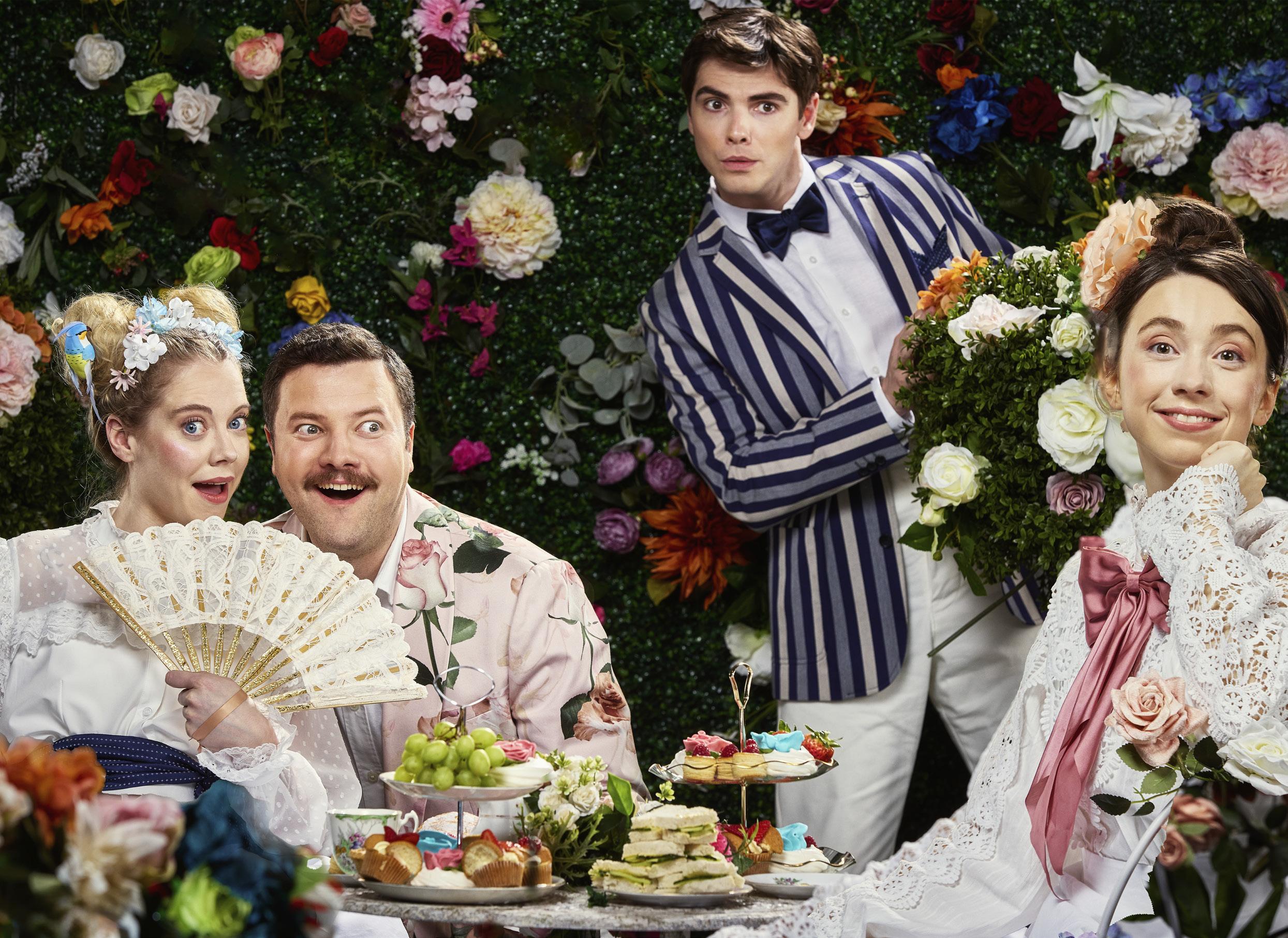
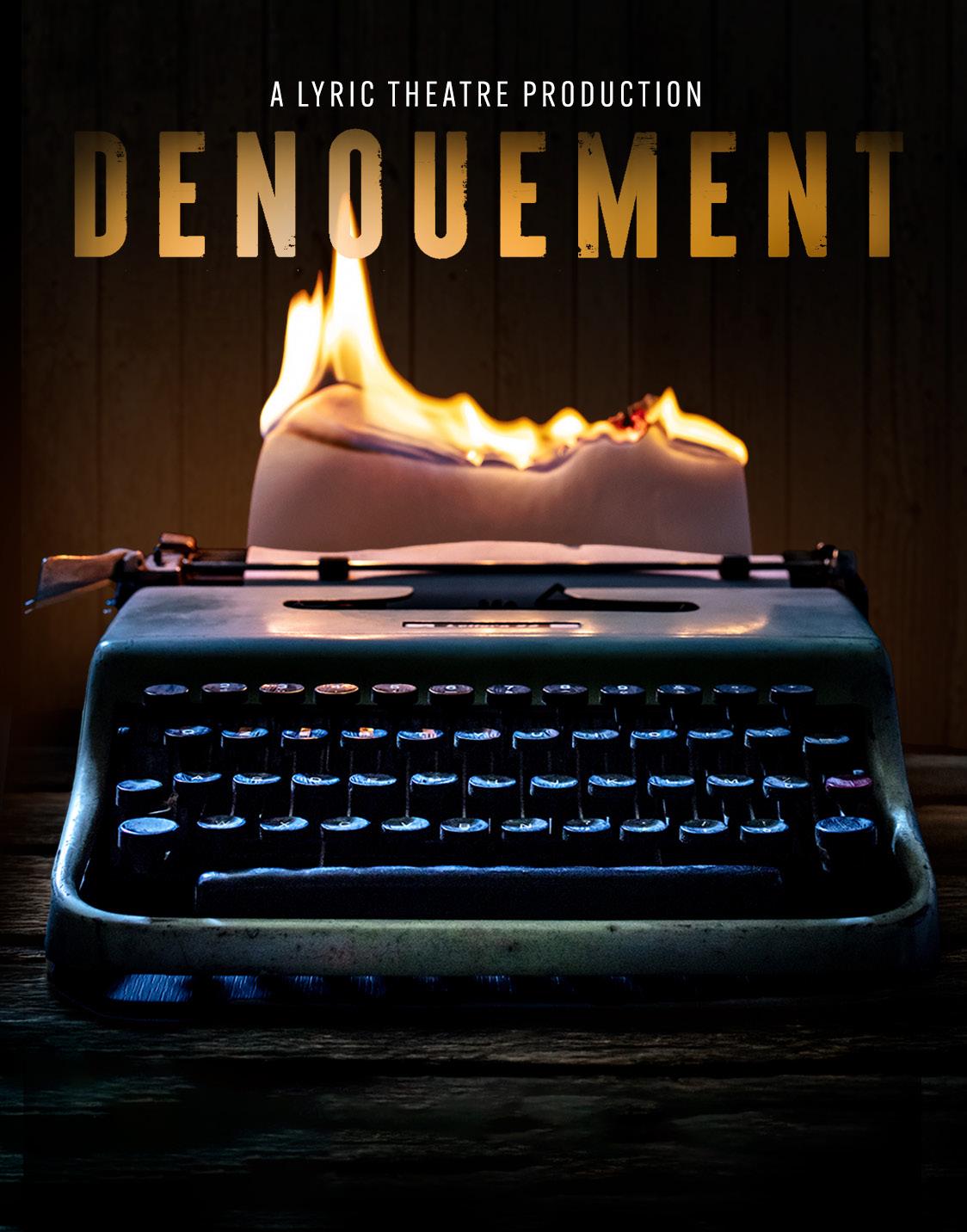
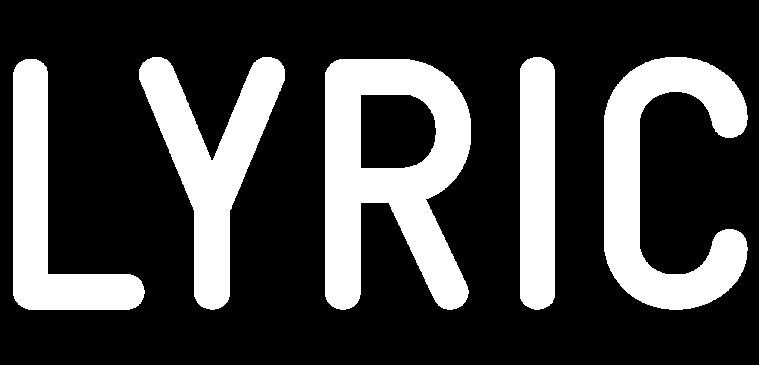
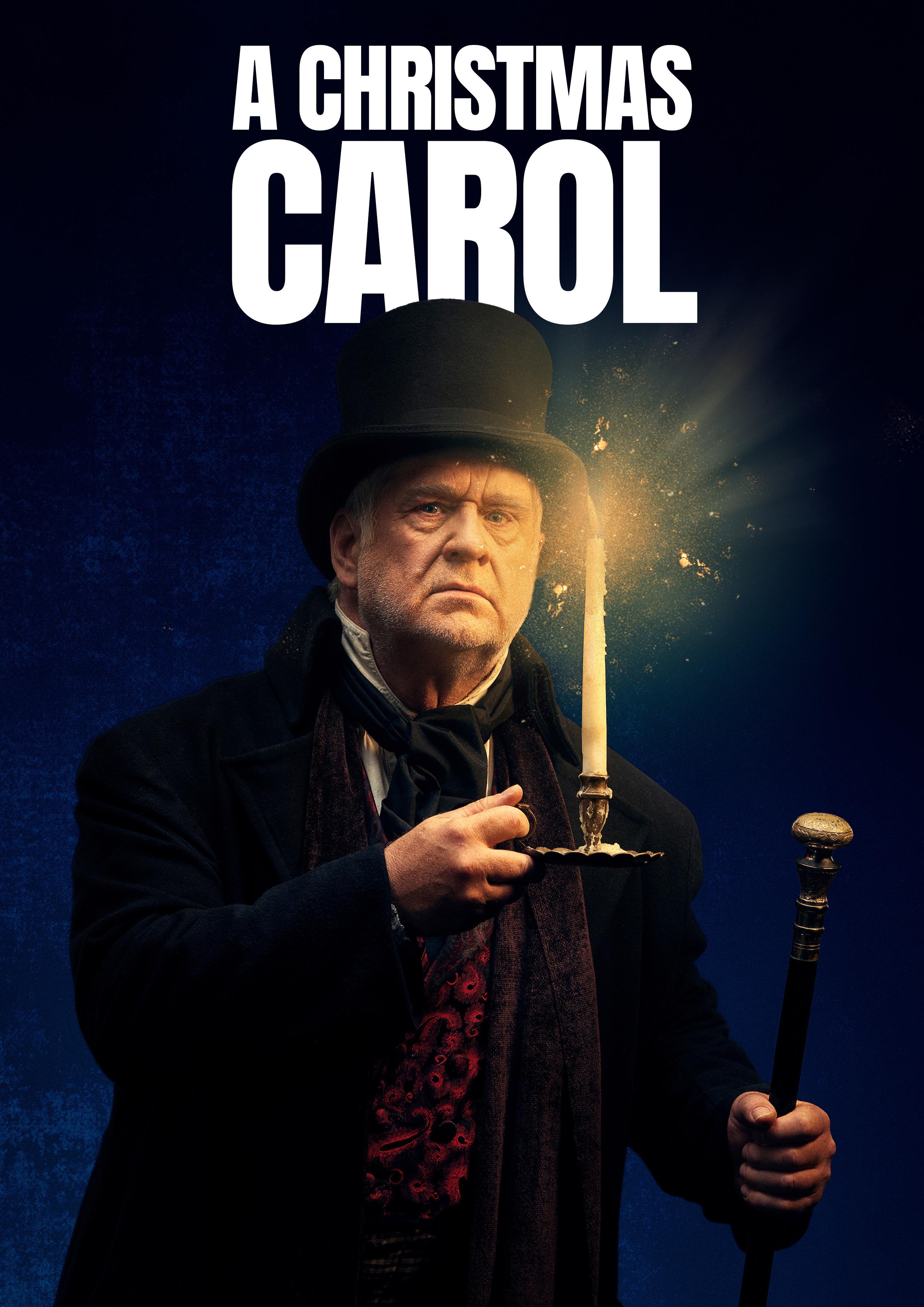

Board of Directors
Sir Bruce Robinson (Chair)
Kirsty Black
Hannah Crowdy
Paul Hayes
Jean Horstman
Ann McGregor
Eoin McMullan
Mike Mullan (Vice Chair)
Dr Mark Phelan
Rosie Timoney
Louise Warde Hunter
Patron
Liam Neeson OBE
Executive Producer
Jimmy Fay
Senior Producer
Morag Keating
Casting Director
Clare Gault
Production Co-Ordinator
Kerry Fitzsimmons
Office Assistant
Laura Rodriguez-Davis
Head of Finance & HR
Micheál Meegan
HR Business Partner
Pousali Deb
Finance Manager
Joanne McDermott
Finance Officer
Shireen Azarmi
Finance Assistant
Andrei Sora
Head of Development & Marketing
Claire Murray
Marketing Manager
Adam Steele
Marketing Officers
Emma Brennan
Naomi Dowling
Kate Morgan
Head of Production
Adrian Mullan
Production Manager
Arthur Oliver-Brown
Assistant Production Manager
Fergal Lonergan
Company Stage Manager
Aimee Yates
Stage Managers
Louise Graham
Conor O’Brien
Technical Manager
Patrick Glackin
Senior Production Technician
Ian Vennard
Theatre Technicians
Cori Conlon
Victoria Emerson
Karl Laidler
Scenic Construction Manager & Lead Carpenter
Aidan Payne
Deputy Scenic Construction Manager
Matt Laverty
Trainee Scenic Carpenter
Ben Fittis
Costume & Wardrobe Manager
Catherine Kodicek
Costume Assistants
Ciara Leneghan-White
Mairead McCormack
Casual Costume Assistants
Lynda Thompson-Spack
Casual Theatre Technicians
Deborah Branson
Patrick Freeman
Joseph Hinchcliffe
Danny O’Shea
Declan Paxton
Casual Scenic Carpenter
Finn Steadman
Casual Scenic Welder
Niamh Muldoon
Casual Scenic Artist
Kathryn Boyle Leanne McDonald
Casual Workshop Assistants
Phelan Hardy
Darren Robinson
Head of Creative Learning
Erin Hoey
Acting Creative Learning Manager
Claire Preston
Creative Learning Assistant
Alice Poole
Head of Customer Service
Julie McKegney
Customer Service Manager
Peter Delahunt
Customer Service Supervisor
Eavann Mallon
Nadège Rousseau
Customer Service
Duty Supervisors
Marina Hampton
Gerard Kelly
Ellen McCormick
Ailish McDonagh
Box Office Manager
Emily White
Box Office Supervisor
Liam Rowan
Housekeeping
Debbie Duff
Customer Service Staff
Rebecca Allen
Pamela Armstrong
Lexie Ashcroft
Mackenzie Banas
Jennie Burns
Carla Bryson
Michelle Calvert
Steven Calvert
Ryan Connolly
Nicholas Craig
Jolene Craig
Conor Cupples
Alacoque Davey
Rebecca Davis
Cara Devlin
Ryan Donnelly
Samantha Duff
Harrison Gordon
Marina Hampton
Joseph Hinchcliffe
Lauren Hutchinson
Chris Kane
Megan Keenan
Gerard Kelly
Greta Kelly
Mairead Knott
Niamh McCabe
Jordan McCaffery
Ellen McCormick
Clara McDevitt
Ailish McDonagh
Jane McErlain
Carol McGill
Patricia McGreevy
Annie McIlwaine
Suke McKegney
Shaunagh McKirgan
Tierna McNally
Catherine Moore
Donál Morgan
Solomon Morrow
Charlotte Newman Casey
Sionnán Ní Nualláin
Fionn O’Hagan
Samantha Obman
Bernadette Owens
Nathalie Parent
Declan Paxton
Bobbi Rai Purdy
Íde Simpson
Simon Sweeney

The Lyric Theatre is a not-for-profit theatre that is proud to be a charity. We self-generate two-thirds of our income through ticket sales, partnerships with the business community, Grants, Trust and Foundations, and support from Friends of the Lyric, including patron donations and memberships.
• Partnering with the Goliath Trust to provide 300+ Primary School children free tickets to our Christmas Production.
• Bursaries for young people who face financial barriers to accessing the arts to attend our Summer Theatre School.
• Providing free tickets to A Midsummer Night’s Dream, The Tragedy of Richard III and A Christmas Carol and follow up workshops.
• Hosting Family Days throughout the year to welcome new families in the local area to engage with the theatre.
• Partnered with large number of community groups to co-design Midsummer including Rogue Encounters, Arts Ekta and Beyond Skin.
• Creation and supporting of 3 new apprenticeship level roles within the Lyric in the areas of scenic construction, production and costume.
• Delivering free workshops in the areas of: Shakespeare, Clowning and Set Design.
• Our Drama Studio programme which provides young people (18+) with subsidised training and networking opportunities.
• Showcasing potential careers on and off stage to the public.
In the last year your donations provided vital support in helping fund a number of projects, including: THANK YOU!
• Delivering seed funding, idea commisions and full WGUK commissions to writers.
• Partnering with the Pleasance Theatre Trust to support two new theatre projects from Northern Ireland.
• Supporting new theatre projects at Fringe Festivals, including Dublin Fringe and Edinburgh Fringe Festival.
• Partnering with Mermaid Arts Centre to provide spaces for ‘Gap Day’ which supports professional theatre practitioners across the Island of Ireland.
• Co-producing with local production companies to showcase new work on our Main Stage.
• Our Scenic Construction workshop which seeks to reduce our impact on the environment during set design and building.
• We offer Accessible performances for every Lyric produced show.
• In our recent production of Richard III, we featured talented d/Deaf and disabled actors in key roles, reflecting our commitment to inclusive casting.
• We also have a long-term partnership with Rogue Encounters, an all-ability group, who have been involved in several of our productions
• Supporting our NI-wide tour of Eco schools project, ‘Waste Busters’ in conjunction with DAERA.
• Lyric Green Team, a team of staff volunteers who plan and co-ordinate sustainability efforts across the organisation.
By supporting the Lyric today, you help us continue to deliver this work. Ways you can support:
• Donations
• Volunteering
• Charitable Gifts in Wills
• Naming a Seat
• Lyric+ Membership
• Private Gifting
• Become a Corporate Star
• Partnering with us on Projects or Productions
• Sponsoring Bursaries for Young People
• Advertising with us
To find out more about supporting the Lyric, email development@lyrictheatre.co.uk
